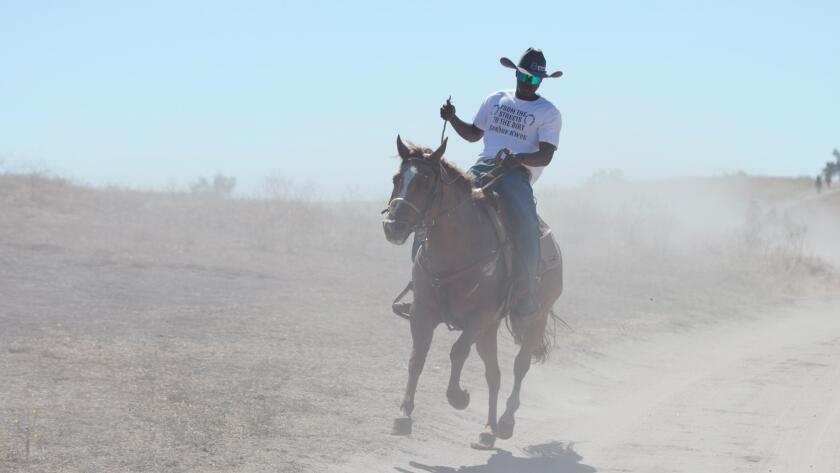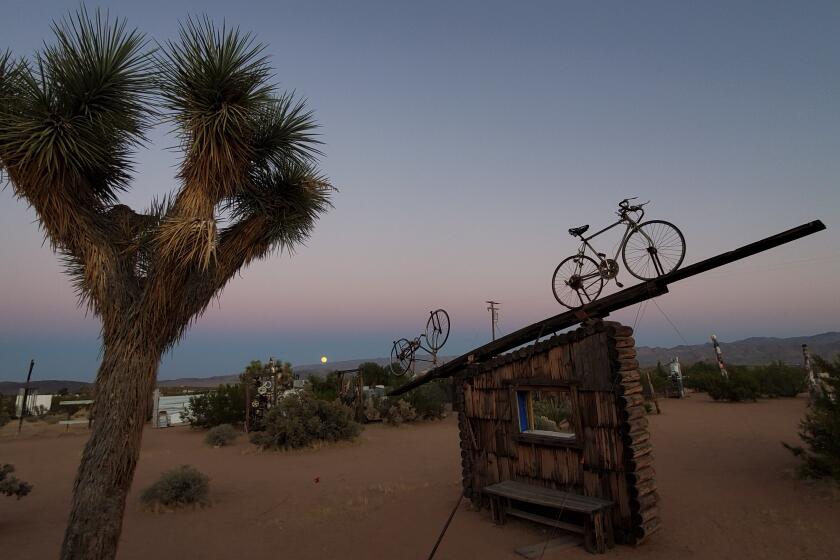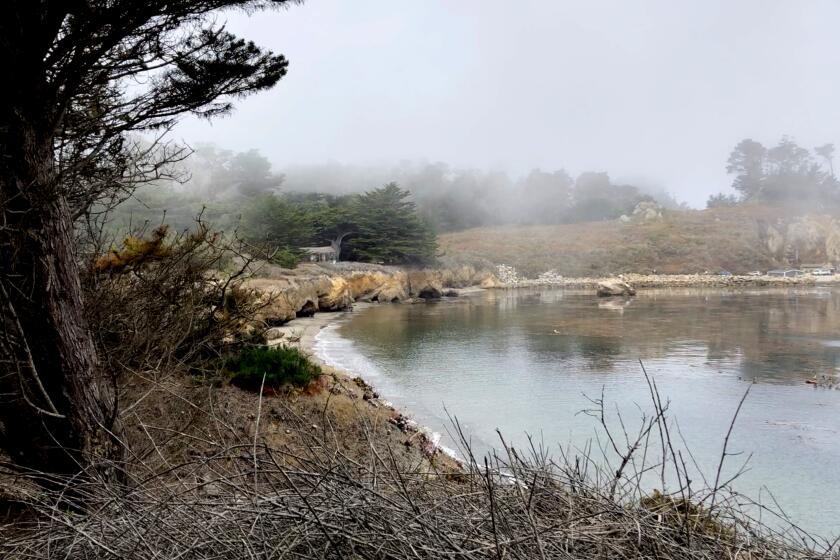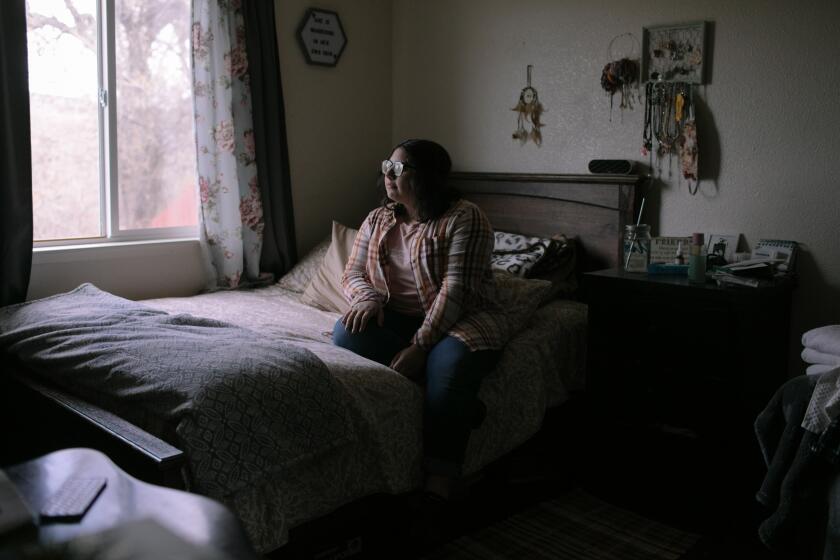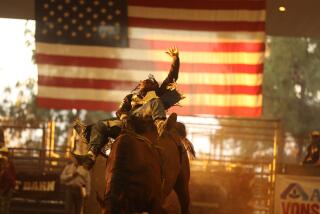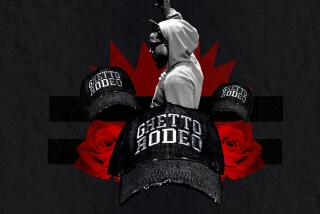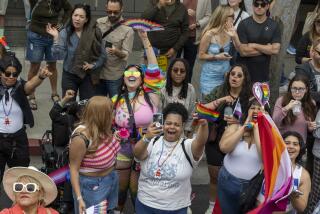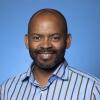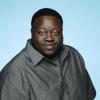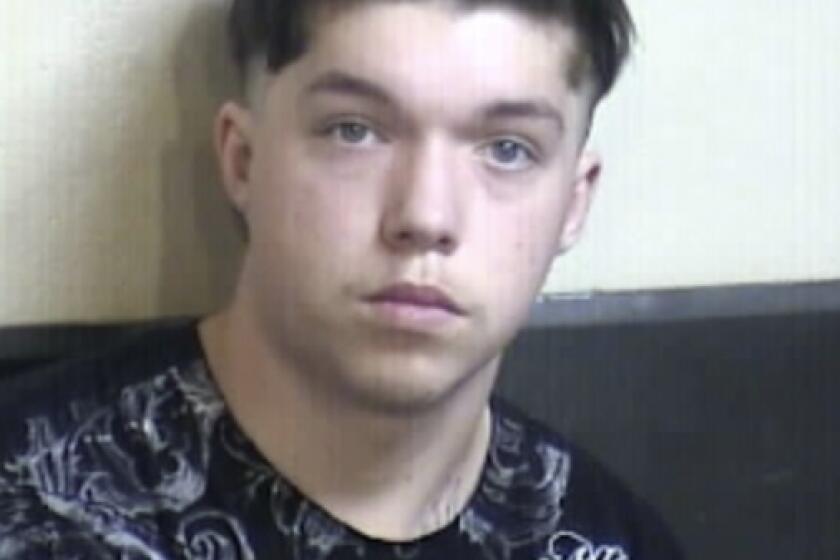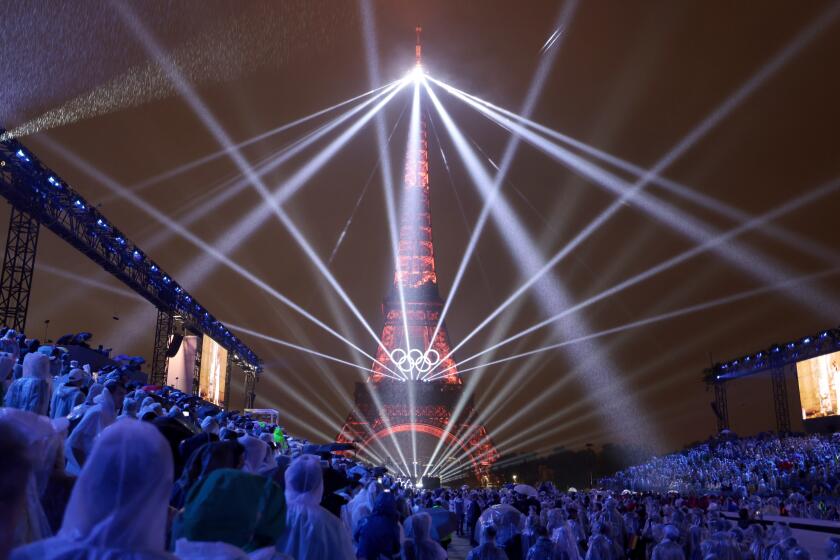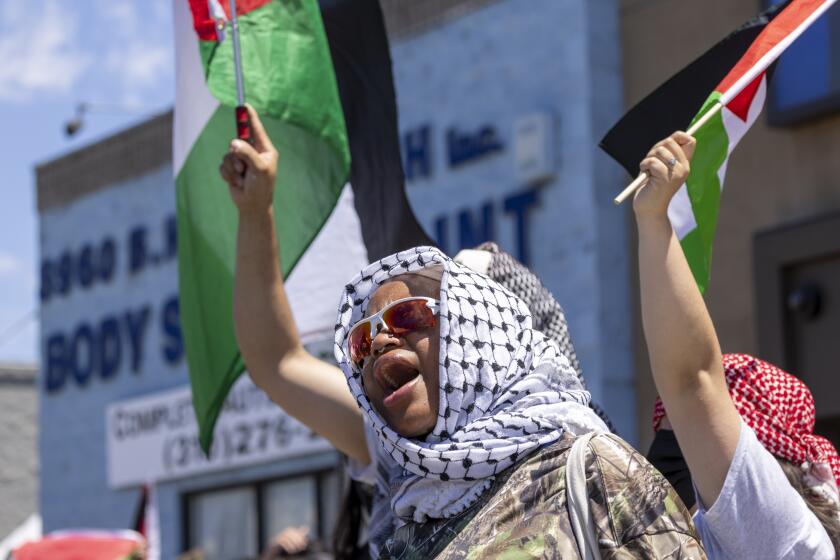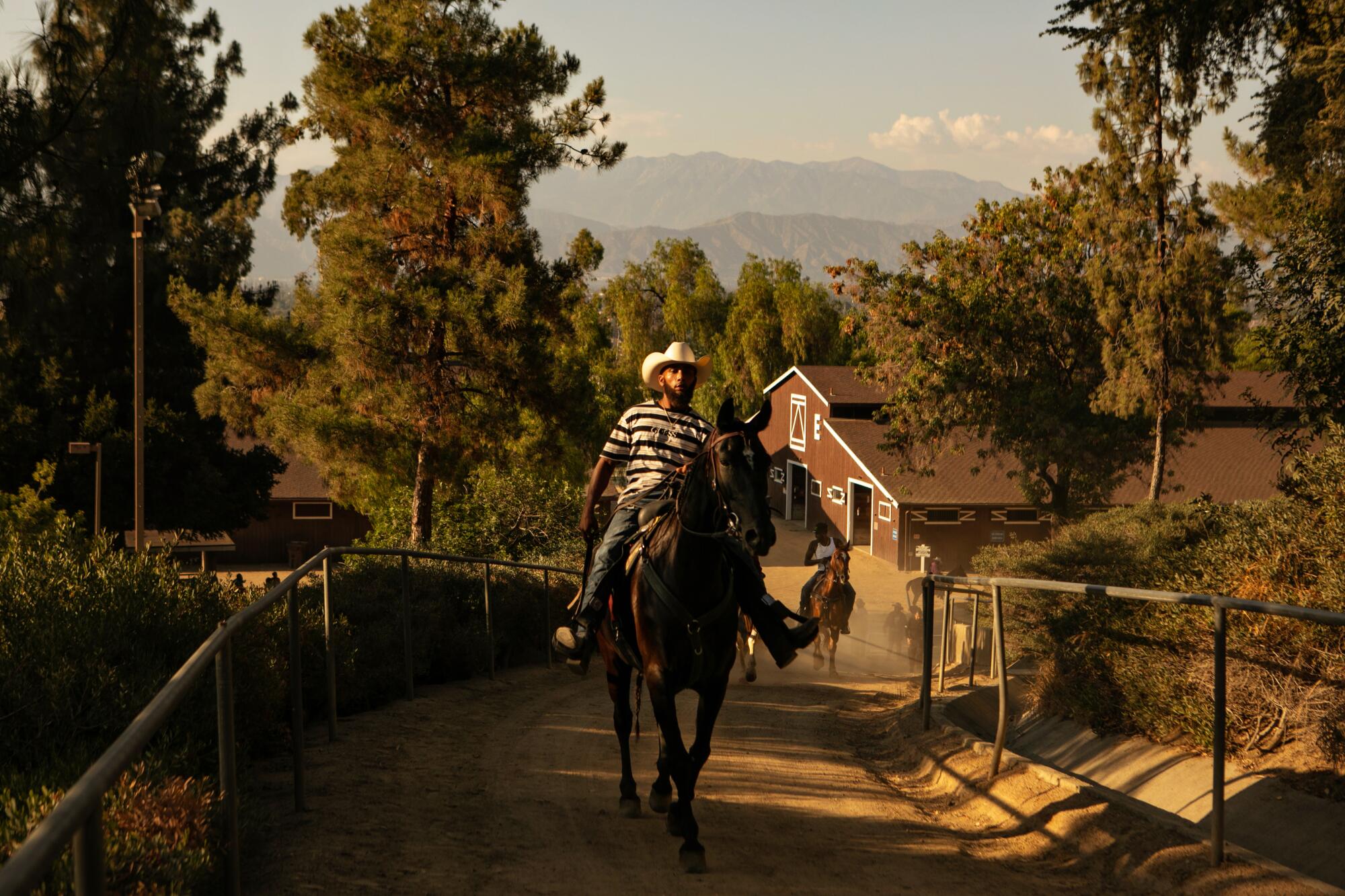
Ron Jennings grew up in Los Angeles, but he’s all country, right down to his cowboy hat and folksy twang.
The 42-year-old smiles when recounting the strange looks he got from fellow passengers during bus rides to his grandfather’s horse stable in Gardena or to participate in rodeos at Griffith Park when he was a teen.
The cowboy hat, the bell clanging against the rodeo gear in his bull bag — he came across as an oddity in the city, even more so because he is Black.
In Oakdale, Calif., many groups of Black horse riders bring their steeds and families, celebrate the traditions of the Old West, and explore their roots with American cowboy life.
Reactions were different when he rode horses down Crenshaw and Martin Luther King Jr. boulevards or to Leimert Park. Neighbors excitedly waved and honked their horns as he moseyed alongside lowriders.
Now Jennings operates a youth bull riding academy at his home in Jurupa Valley, and his 12-year-old son, Andrew, is a rising rodeo star in his own right.
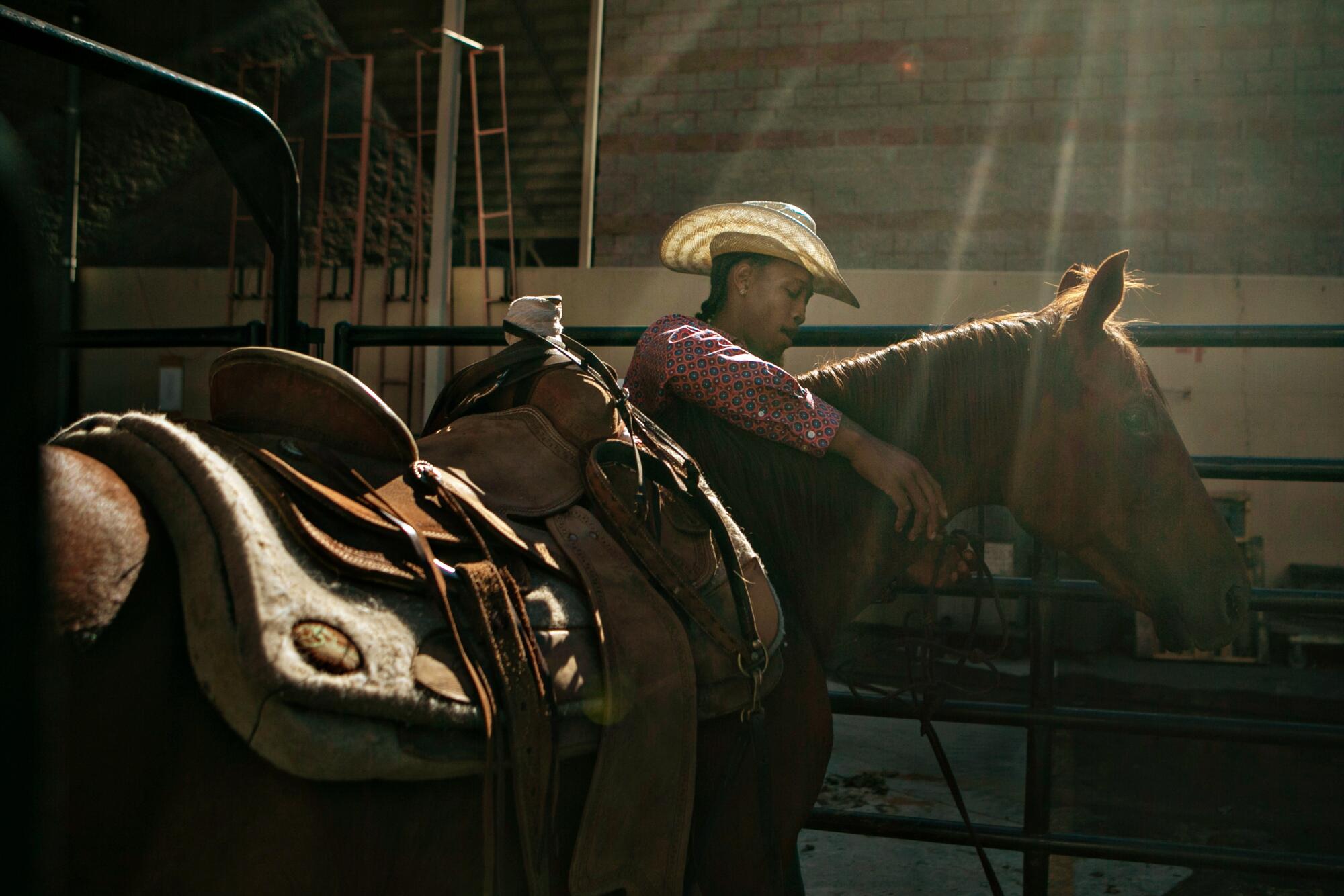
As a Black man in America, I’ve always struggled to embrace a country that promotes the ideals of justice and equality but never fully owns up to its dark history of bigotry, inequality and injustice.
Now, more than any time in recent history, the nation seems divided over this enduring contradiction as we confront the distance between aspiration and reality. Join me as I explore the things that bind us, make sense of the things that tear us apart and search for signs of healing. This is part of an ongoing series we’re calling “My Country.”
— Tyrone Beason
Growing up, I couldn’t think of a more powerful symbol of the American West than a white man with his horse: Clint Eastwood as cattle driver Rowdy Yates, staring me down with his icy gaze. The Lone Ranger crusading against injustice on his stallion Silver. President Reagan — a former B-movie cowboy — striking iconic poses for the press in his hat, jeans and boots at his ranch outside Santa Barbara.
I wasn’t taught about the Black rodeo athletes, trail riders, ranchers and horse trainers who, like Jennings today, draw strength from the same traditions that Hollywood made me fall in love with.
Black cowboys and cowgirls are finally getting their moment to shine in the mainstream.
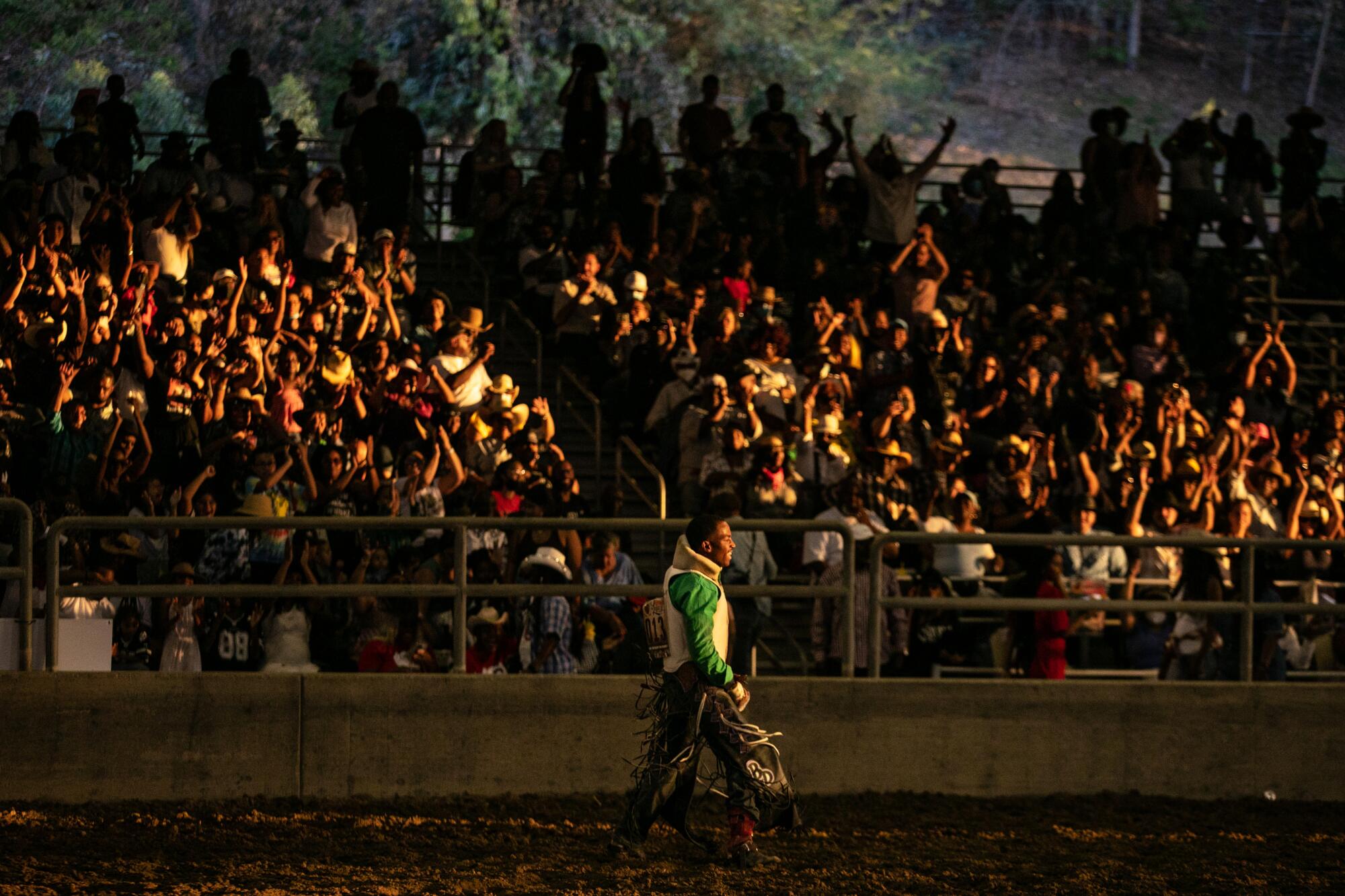
The recent films “Nope,” “The Harder They Fall” and “Concrete Cowboy” have burned images of Black ranchers, settlers and riders into the public’s consciousness.
Pop stars like Lil Nas X, Beyoncé and her sister, Solange, who celebrate country and western culture’s Black roots in their music and videos, have imbued it with a certain hip factor.
Professional rodeo athletes like Shad Mayfield, a cattle roper who’s ranked among the best in the world, make up a new legion of role models for Black children.
At the Bill Pickett Invitational Rodeo’s latest stop in City of Industry east of Los Angeles, not only are all of the cowboys and cowgirls Black — so are most of the 3,500 spectators.
Several demonstrators chant and wave signs outside the arena to protest a sport that many Californians consider cruel to animals. The fans file past the protesters, seemingly unfazed. Some describe the nation’s largest touring Black rodeo as akin to a cultural celebration — and a kind of homecoming.
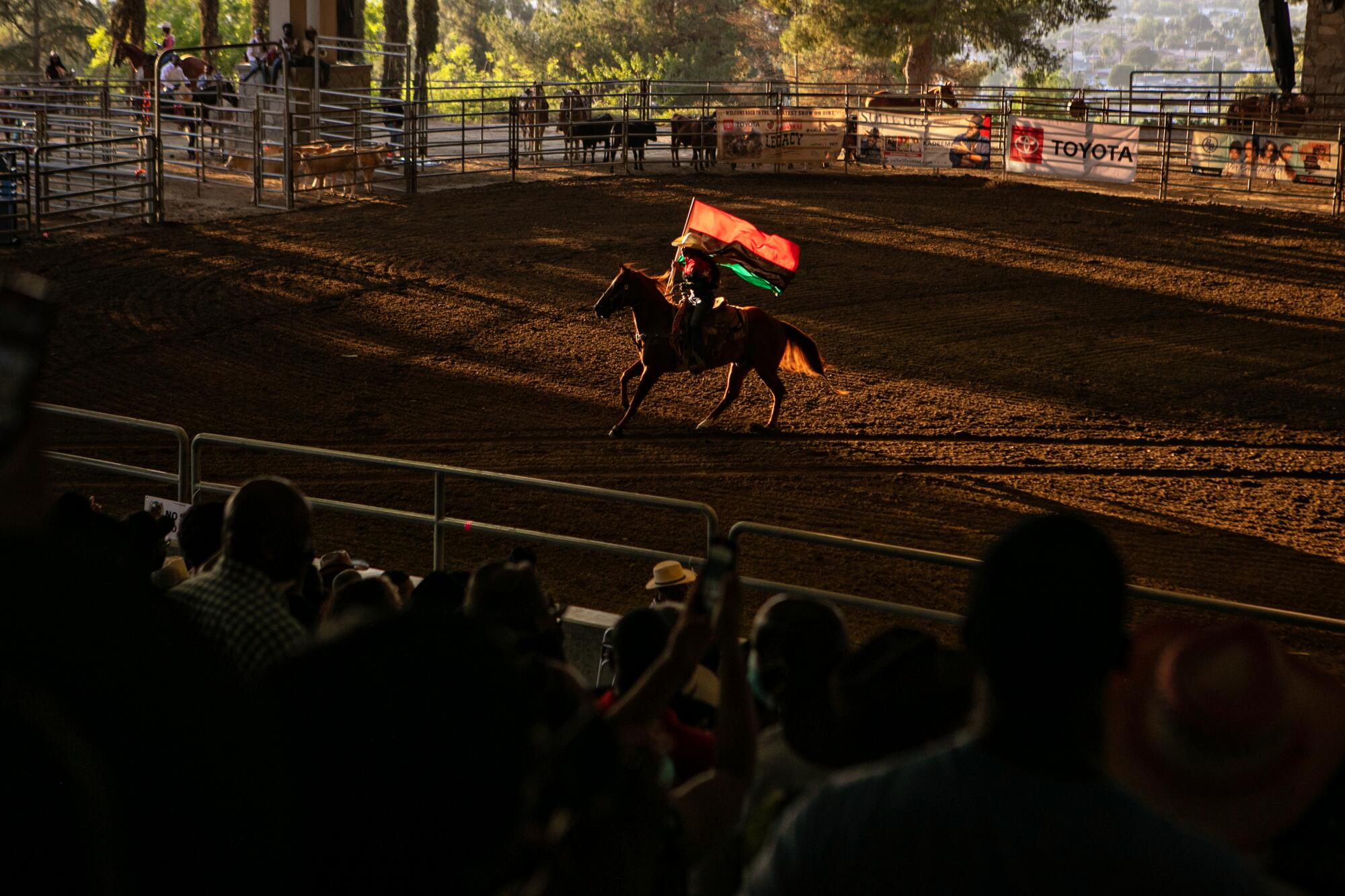
The evening gets underway with horseback riders trotting into the arena. Sunbeams radiate behind them.
Some, wearing western shirts with suede tassels and reptile-print boots, lift their chins like kings and queens. One carries a little boy on his lap who’s sucking a pacifier; the toddler wears a T-shirt that reads, “Future cowboy.”
When Ray Charles’ “America the Beautiful” blasts from loudspeakers, one woman raises her hands from her horse’s reins, looks joyously to the sky and lip-syncs every line.
The air smells of catfish frying and barbecue simmering. Vendors dish out Philly-style ice treats and peach cobbler baked the Deep South way, with pecans.
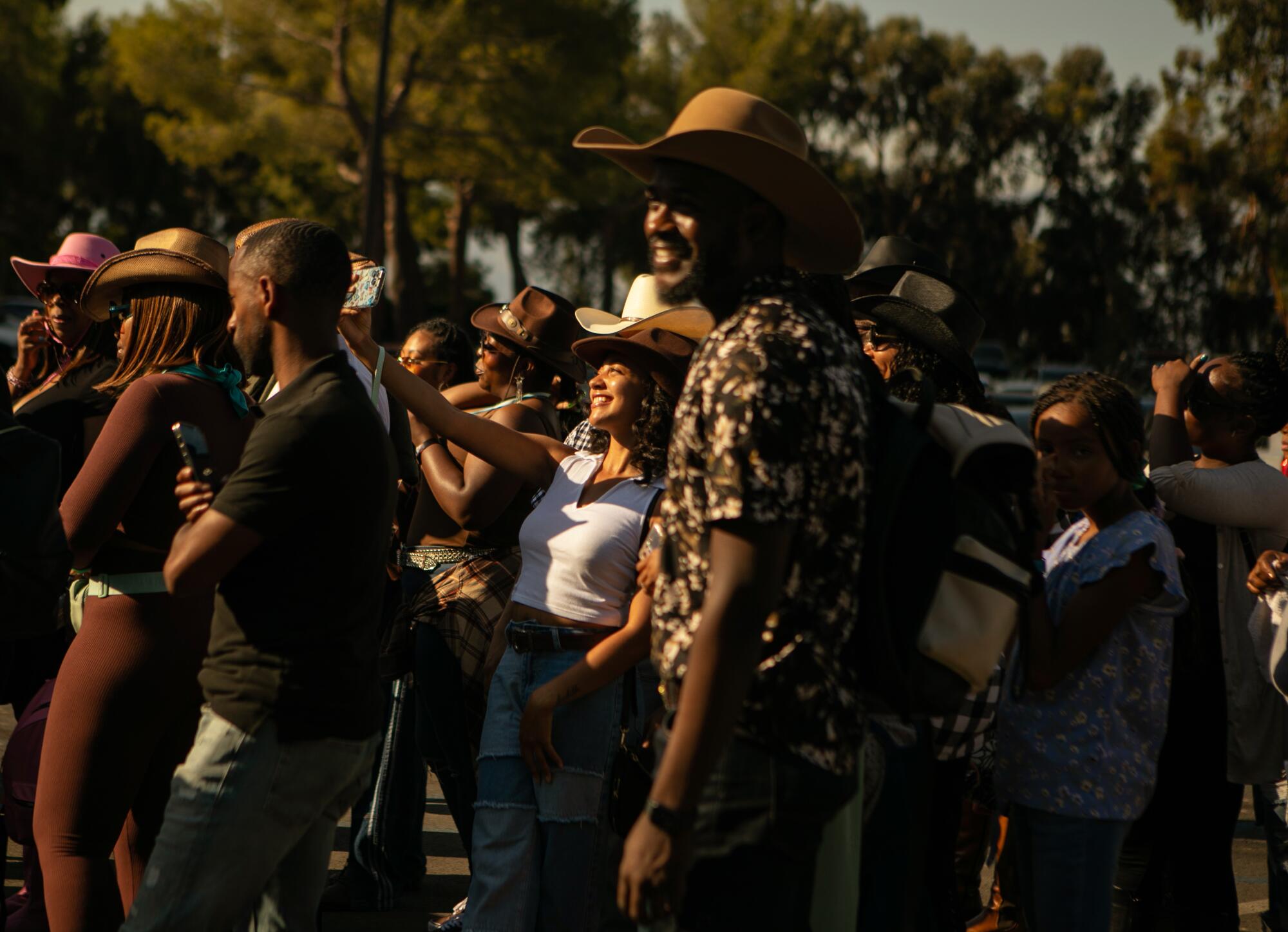
The crowd cheers as L.A. musician Howard Johnson gets down on both knees during his rapturous rendition of “Lift Every Voice and Sing,” known as the “Negro national anthem.” The audience grooves to Tupac Shakur and Dr. Dre’s “California Love” as riders file out to make way for bull riding, calf roping, barrel racing and other competitions.
There’s something special about Black people coming together to revel in this heritage, says Kairis Chiaji, 51, of the Loyalty Riderz, a Black trail riding club outside Sacramento.
“In these spaces,” Chiaji says, “it’s safe to be us.”

It was hard to conceal my amazement while attending the Bill Pickett rodeo last year at the MGM Grand arena in Las Vegas — the first time the event had been nationally televised in its 40-year history.
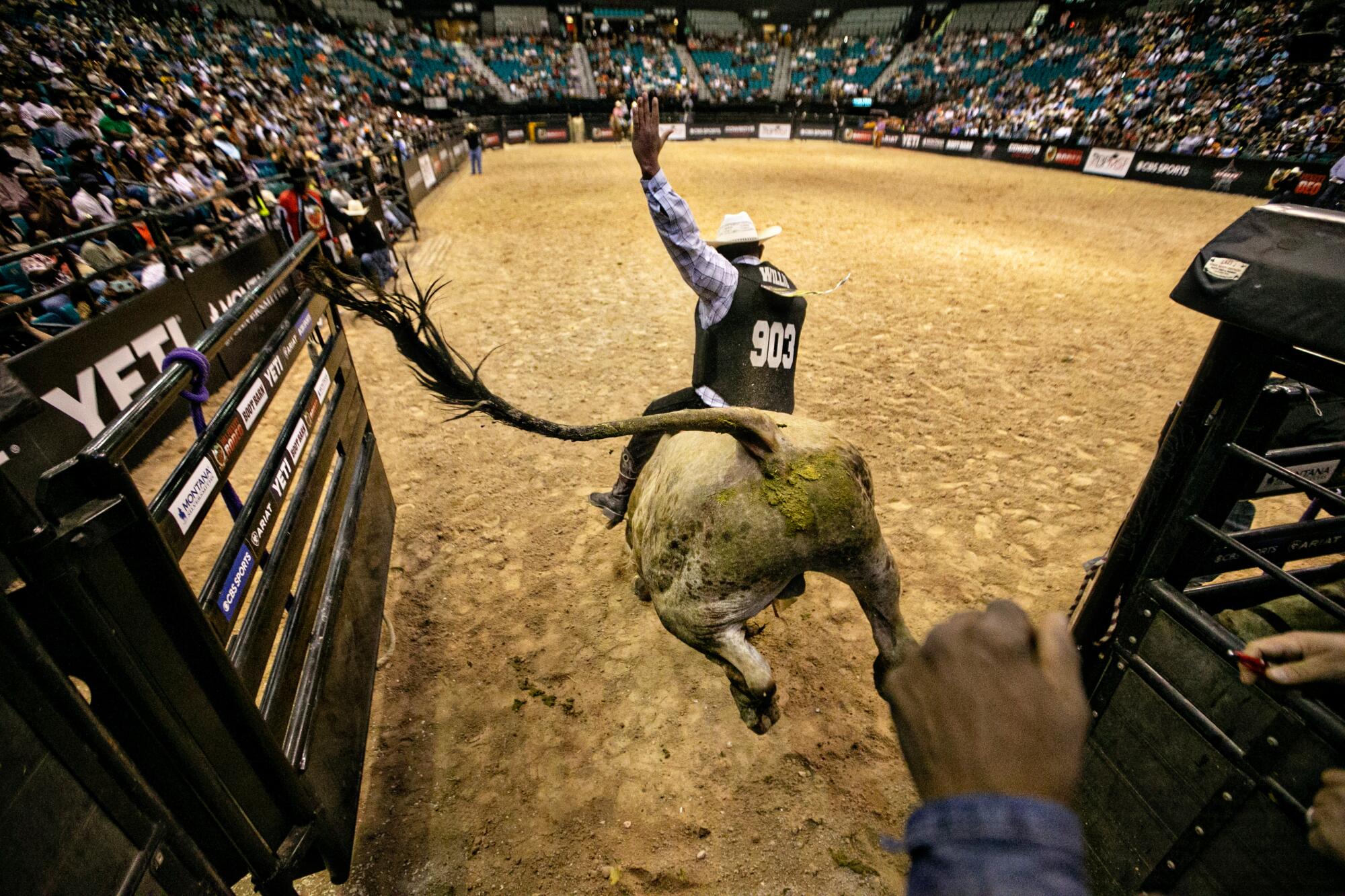
The scenes were almost too much to take in: The horseback rider waving the black, red and green flag of Black liberation. The Black cowboys and cowgirls riding tall in the saddle for the whole country to take in their glory. The Black rodeo clown who stole the show with his jokes and exaggerated Southern drawl.
Then came the main events. Lamontre Hosley, one of the fabled Compton Cowboys, thrilled the crowd on a bucking bronco for seconds that felt to me like agonizing minutes. In barrel racing, Black women on horseback sprinted at breakneck speed, plucking flags from each obstacle they circled.
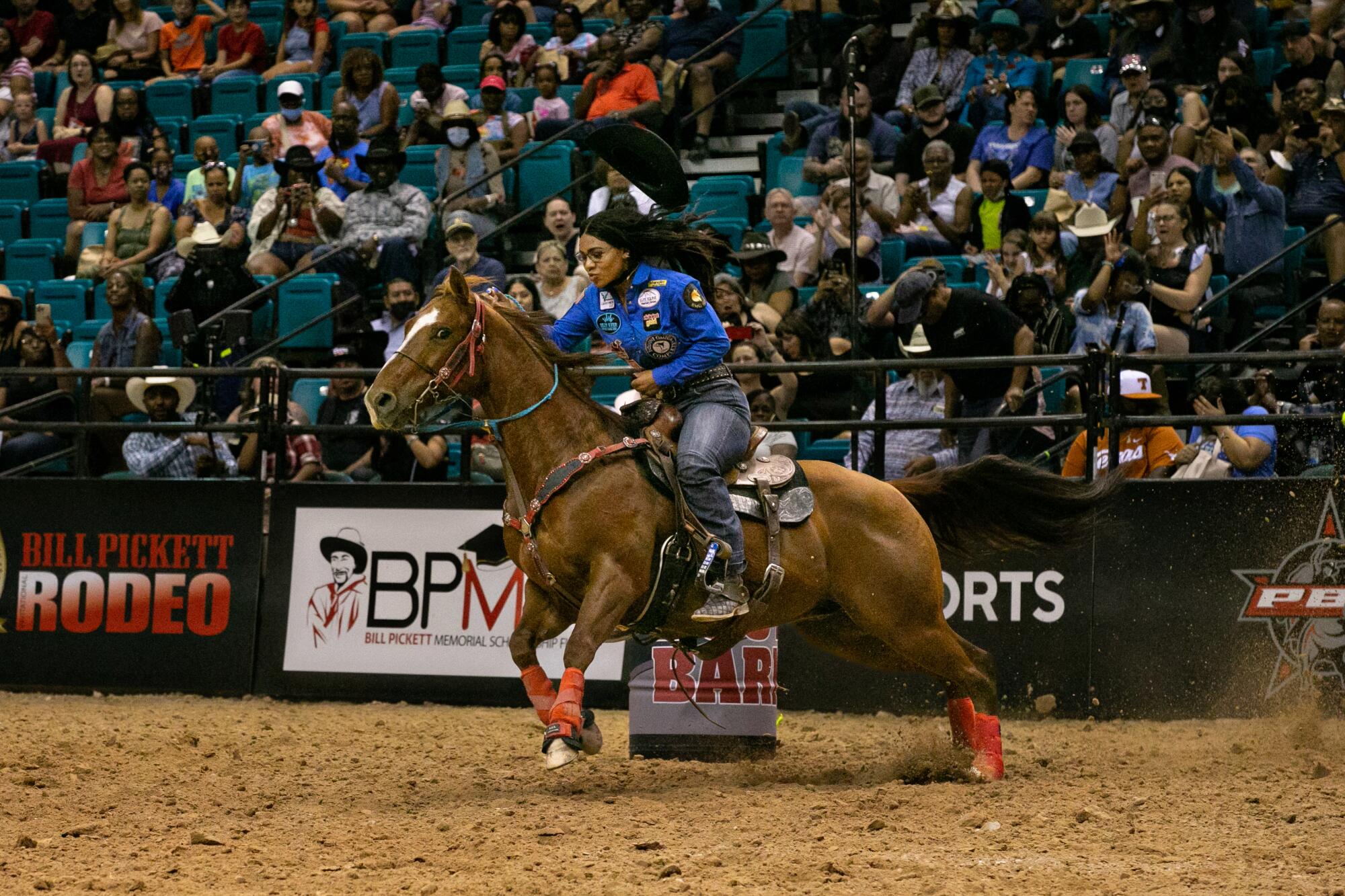
Bill Pickett was one of the greatest Black bull riders of the Old West, and his likeness stands among real and fictional white cowboys on a mural at the Autry Museum of the American West at L.A.’s Griffith Park.
Backstage in Vegas were legends from our time. L.A. native Charlie Sampson, who in 1982 became the first Black man to win a world championship in bull riding, mingled with younger competitors. One of the emcees, actor and Southern California ranch owner Glynn Turman (“The Wire,” “Ma Rainey’s Black Bottom”), shared childhood memories of riding horseback in New York’s Central Park.
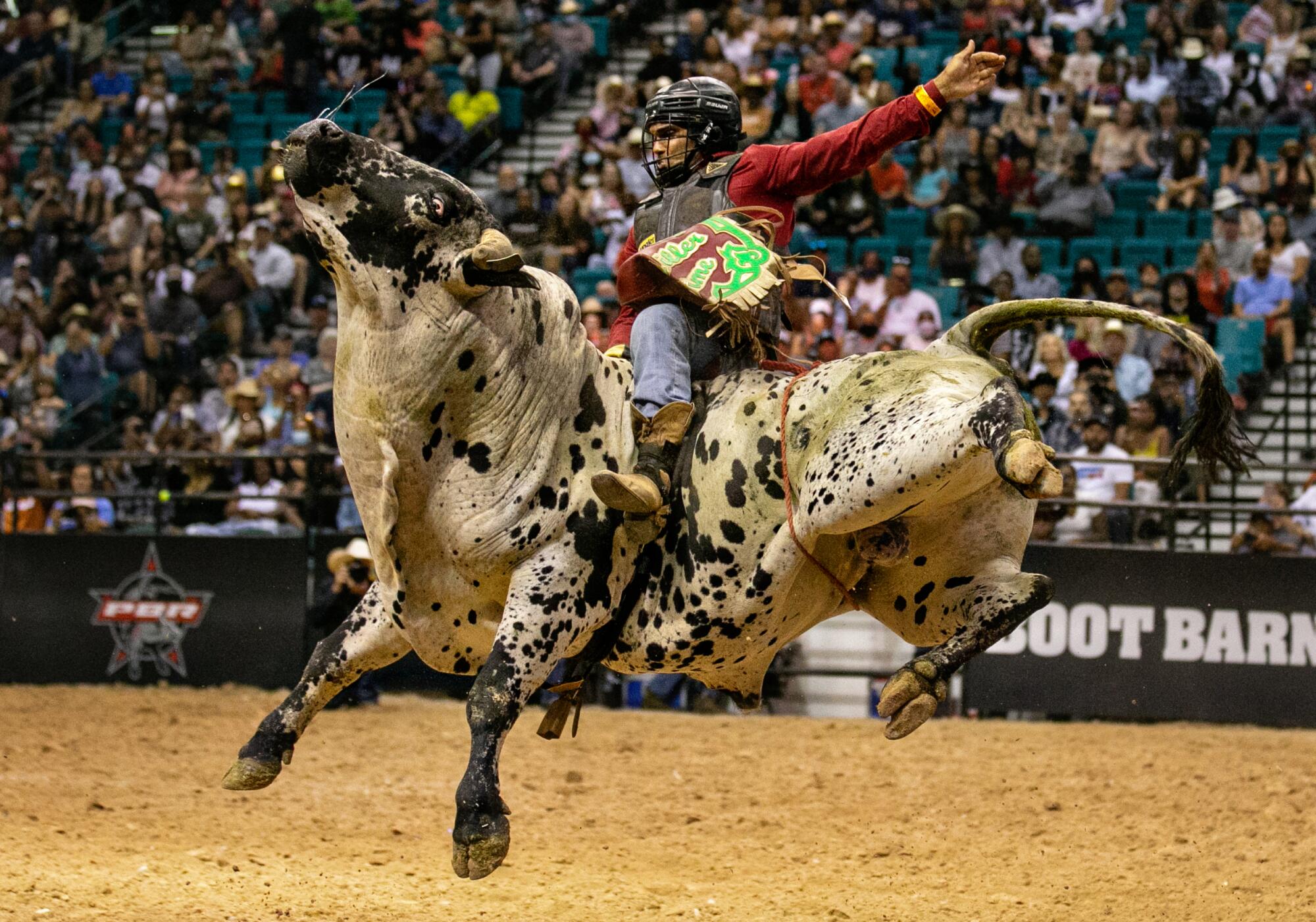
“Sadly, in our culture, in American culture at large, there’s a monolithic view of what Black people do and don’t do,” says historian Tyree Boyd-Pates, an associate curator at the Autry Museum. “The moment you see a Black man, or woman or child, on a horse, it’s a departure from what we expect.”
The term “cowboy” itself has roots in America’s legacy of racism.
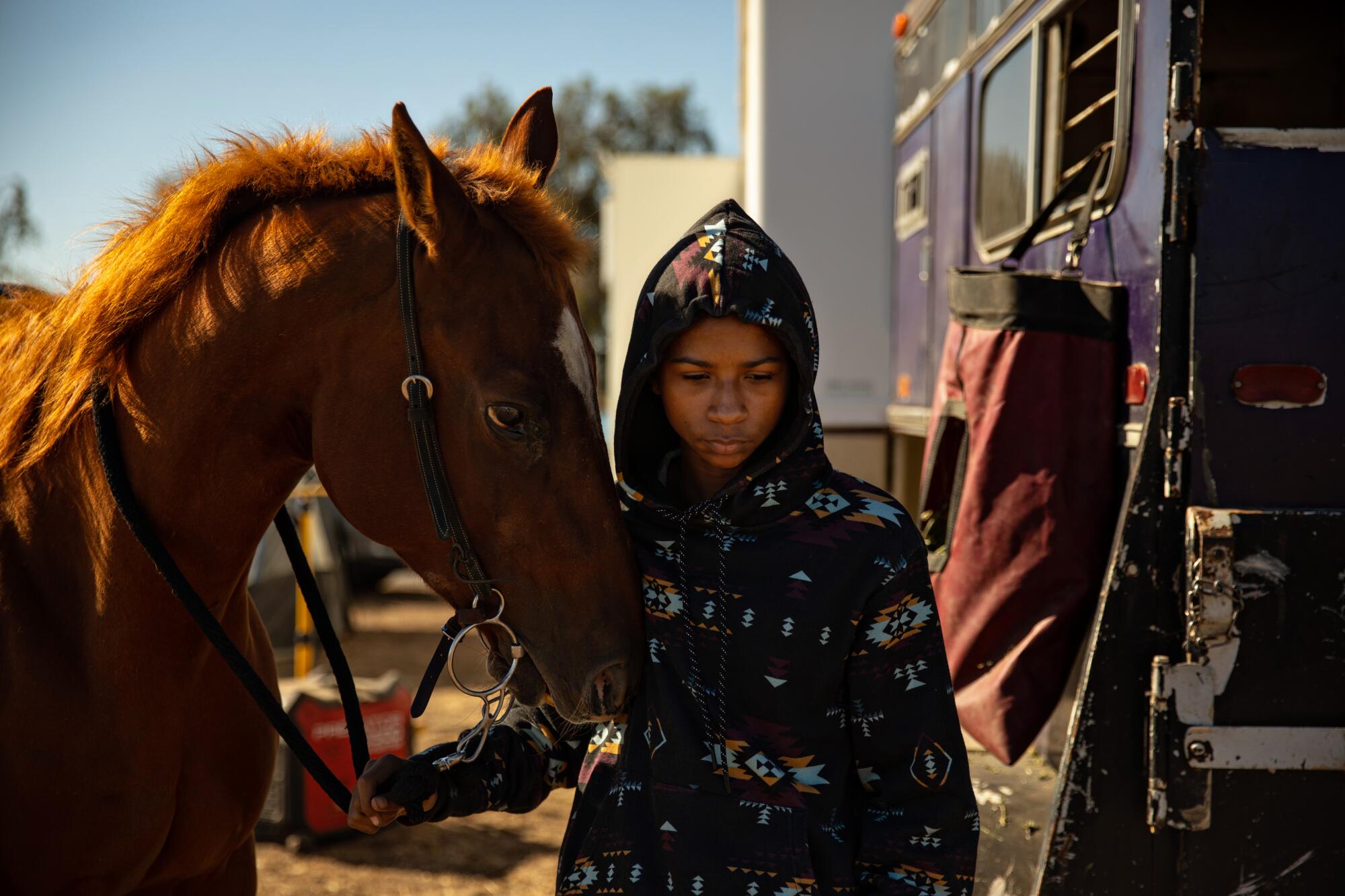
It originated as an epithet used to demean Black cattle drivers and ranch hands, who made up as much as a quarter of all such workers in the Southwest in the late 1800s, says Boyd-Pates.
When Black men call themselves “cowboys” and Black women refer to themselves as “cowgirls,” Boyd-Pates says, they take pride in being able to transform a painful history into something they can glorify.

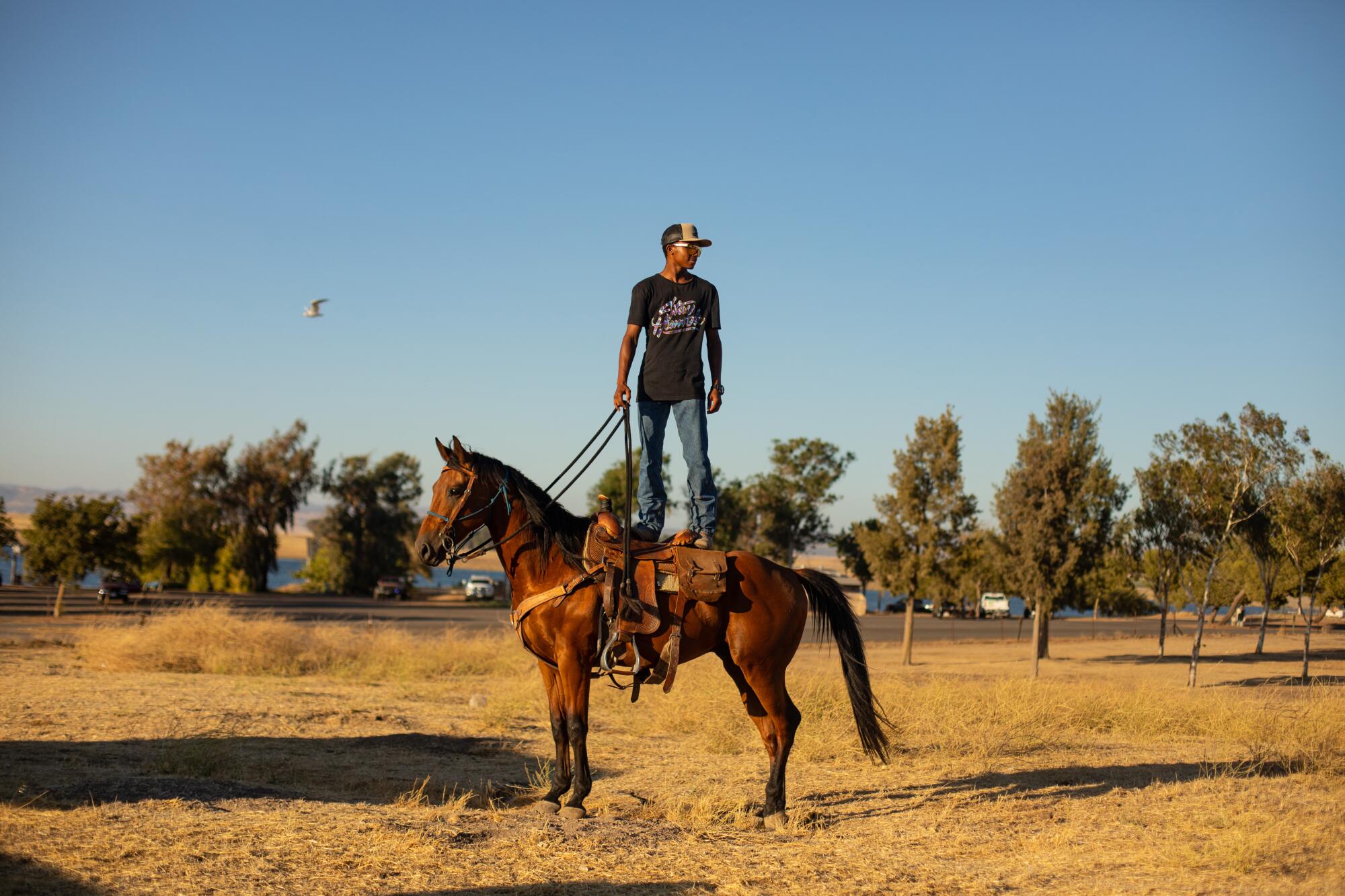
Racial pride is also on full display among the Black ranchers, trail riders and horse trainers who live in the countryside south of Sacramento.
“We are the original cowboys, and the world is waking up to that,” says Greg Bradley Sr., president of the Loyalty Riderz club. Some members attended the rodeo in L.A.
One late afternoon, Bradley, Chiaji and other riders gather under a shade tree at the ranch owned by two fellow members, Zena and Frederick Perres. Horses putter around in the gently rolling field behind the Perres’ small house.
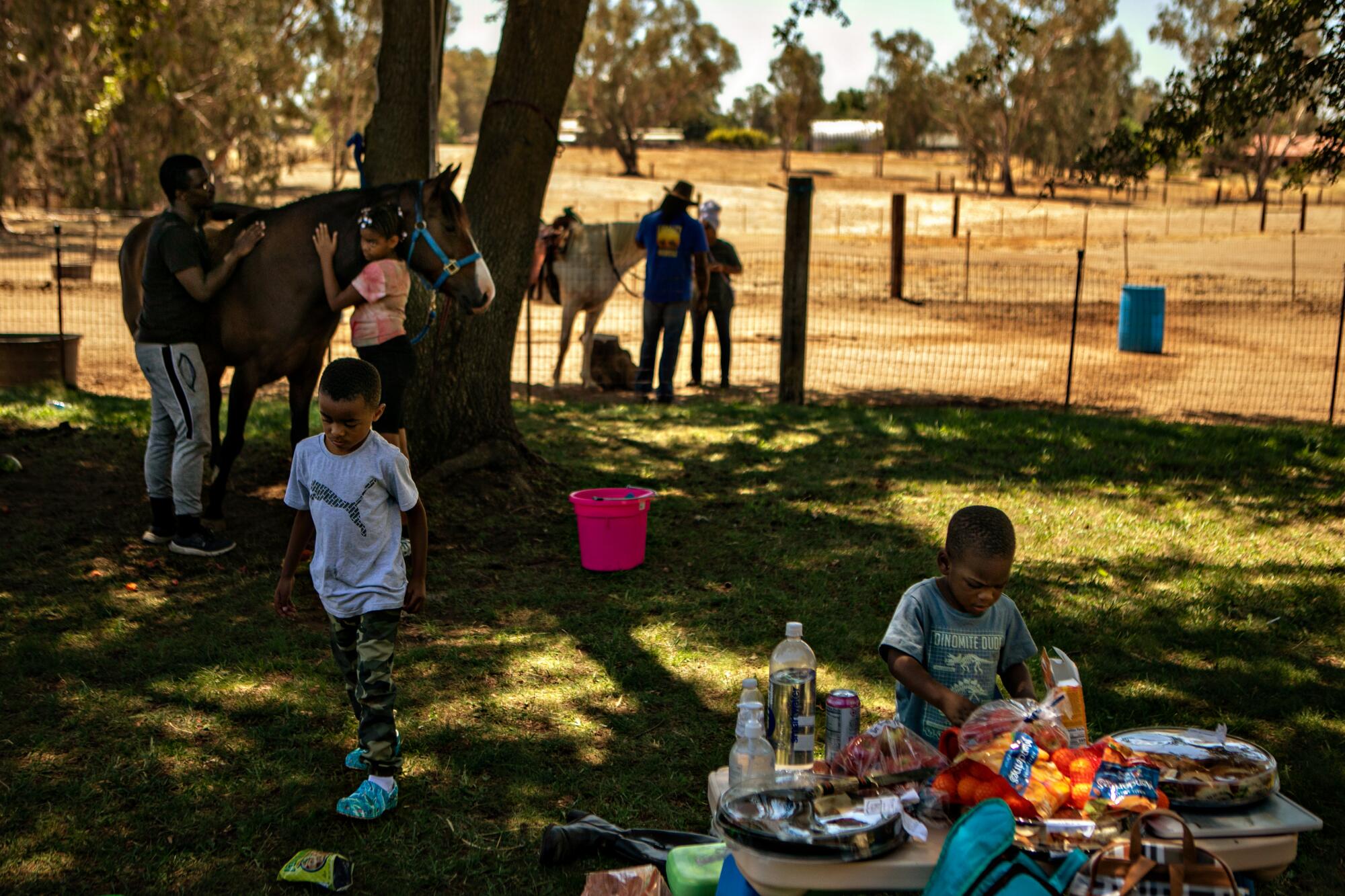
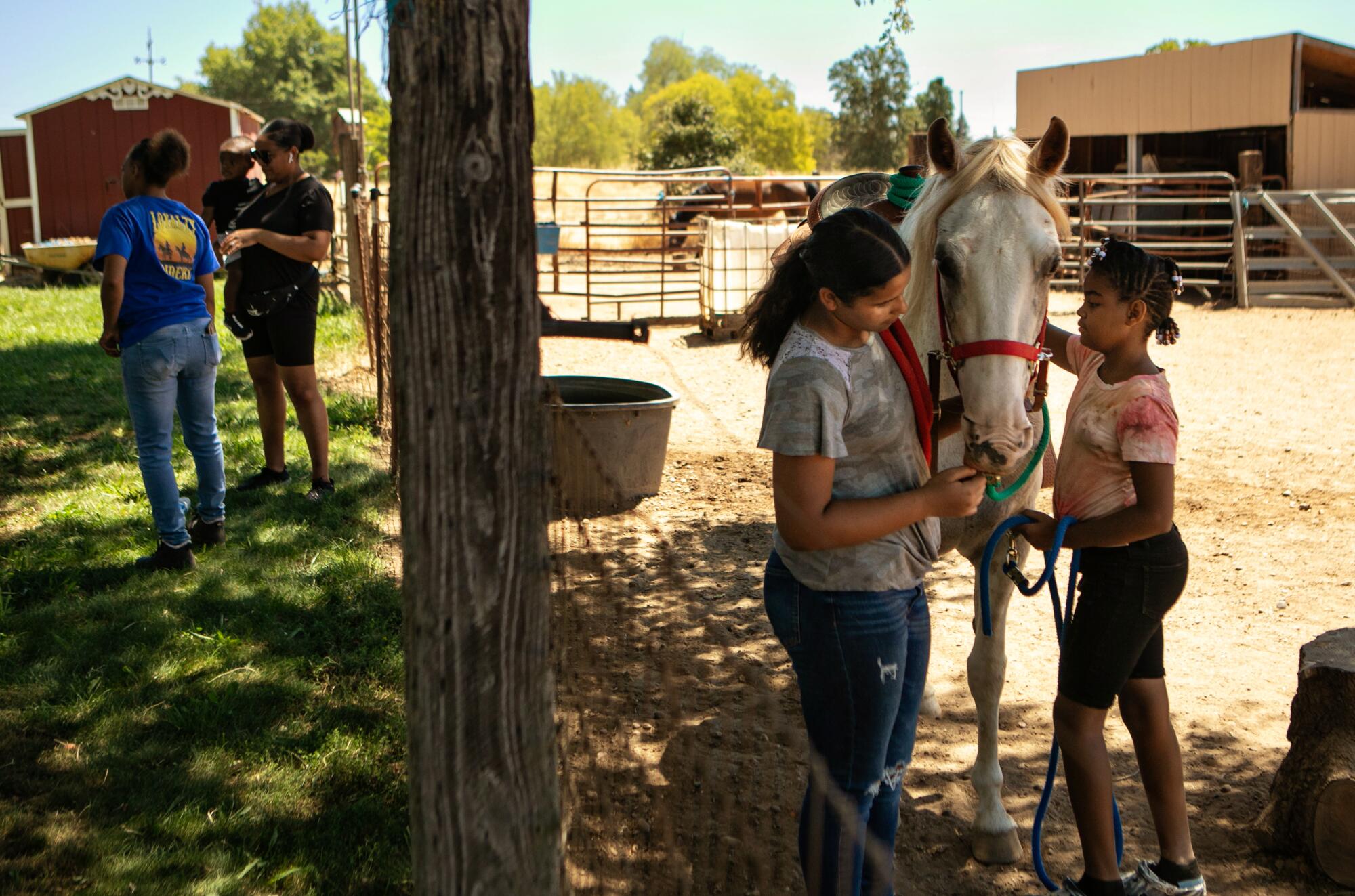
“We’re here to stay”: Black Californians put down roots in the desert
Bradley, 67, a retired Sacramento County employee, is known as “Big G” among fellow riders. He’s originally from Marlon, Texas, where his father owned a 500-acre ranch.
Most of those gathered express a determination to expose Americans to another facet of the West — and the Black experience.
“What’s televised about our culture, it’s always negative — Black-on-Black murders,” says Byron Levy, whose wife, Michelle, also rides with the club. “But none of this is ever televised — how we get together with four or five hundred Black cowboys and cowgirls and there’s no incidents ... Al Sharpton don’t have to show up.”
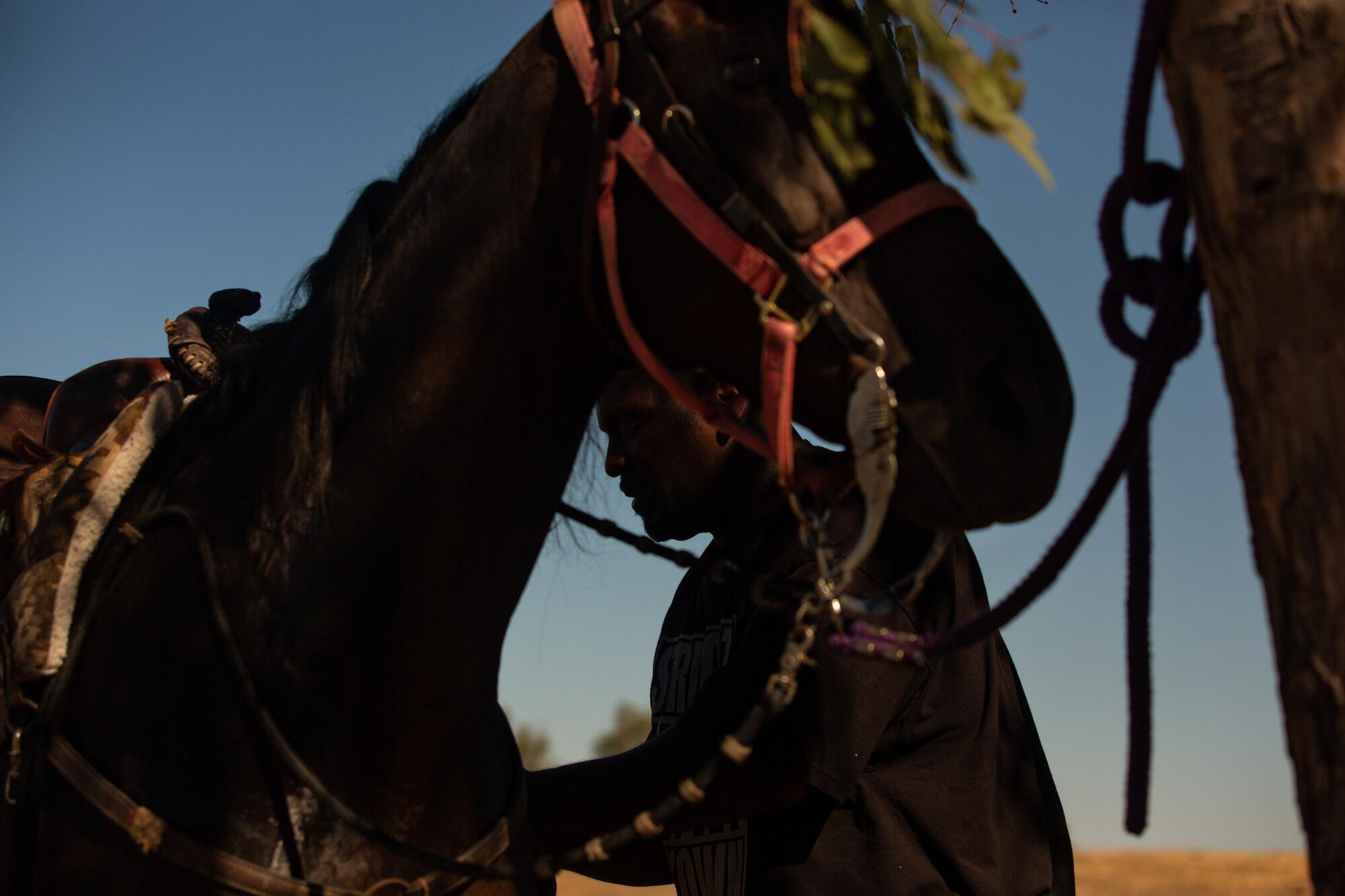
A welcome calm greets newcomers to the Inland Empire, who come to seek their version of the American dream.
On a Saturday morning, horses bite into melon halves in the backyard of the Perres home while school-age visitors from Sacramento who’ve never before seen a horse in real life timidly pet the animals’ cheeks and foreheads.
Out front, a woman returns from a horseback ride, her towering white headwrap gleaming in the sun.
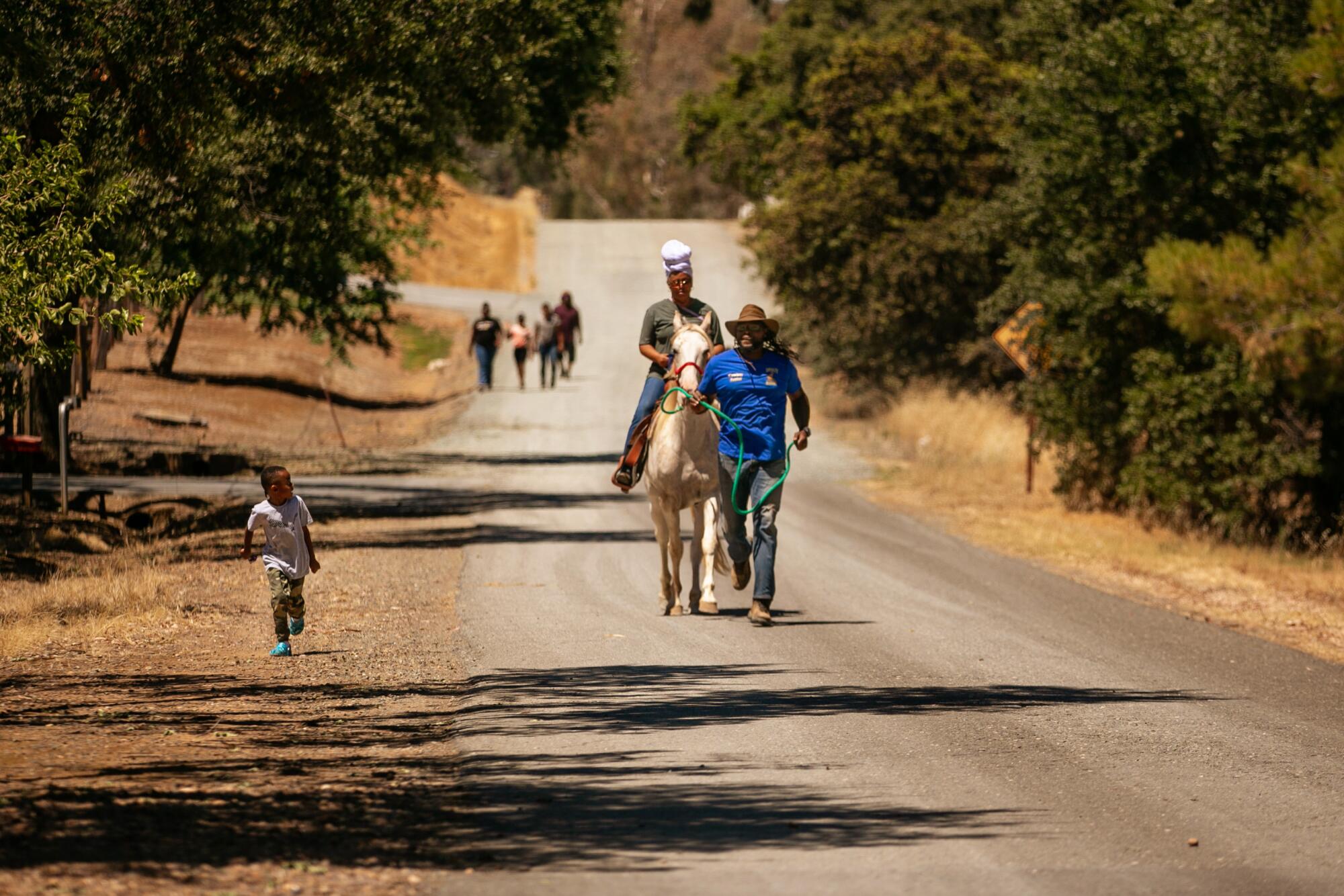
A few miles away in Elk Grove, Brittney Chambers and her sister Christalle Chambers wrangle with a stubborn horse at CBC Therapeutic Horseback Riding Academy.
They feel a personal connection to the history of Black equestrians.
“Black people were trainers at the racetrack. We were the jockeys. We did everything,” says Brittney Chambers, 32, who founded the academy seven years ago.
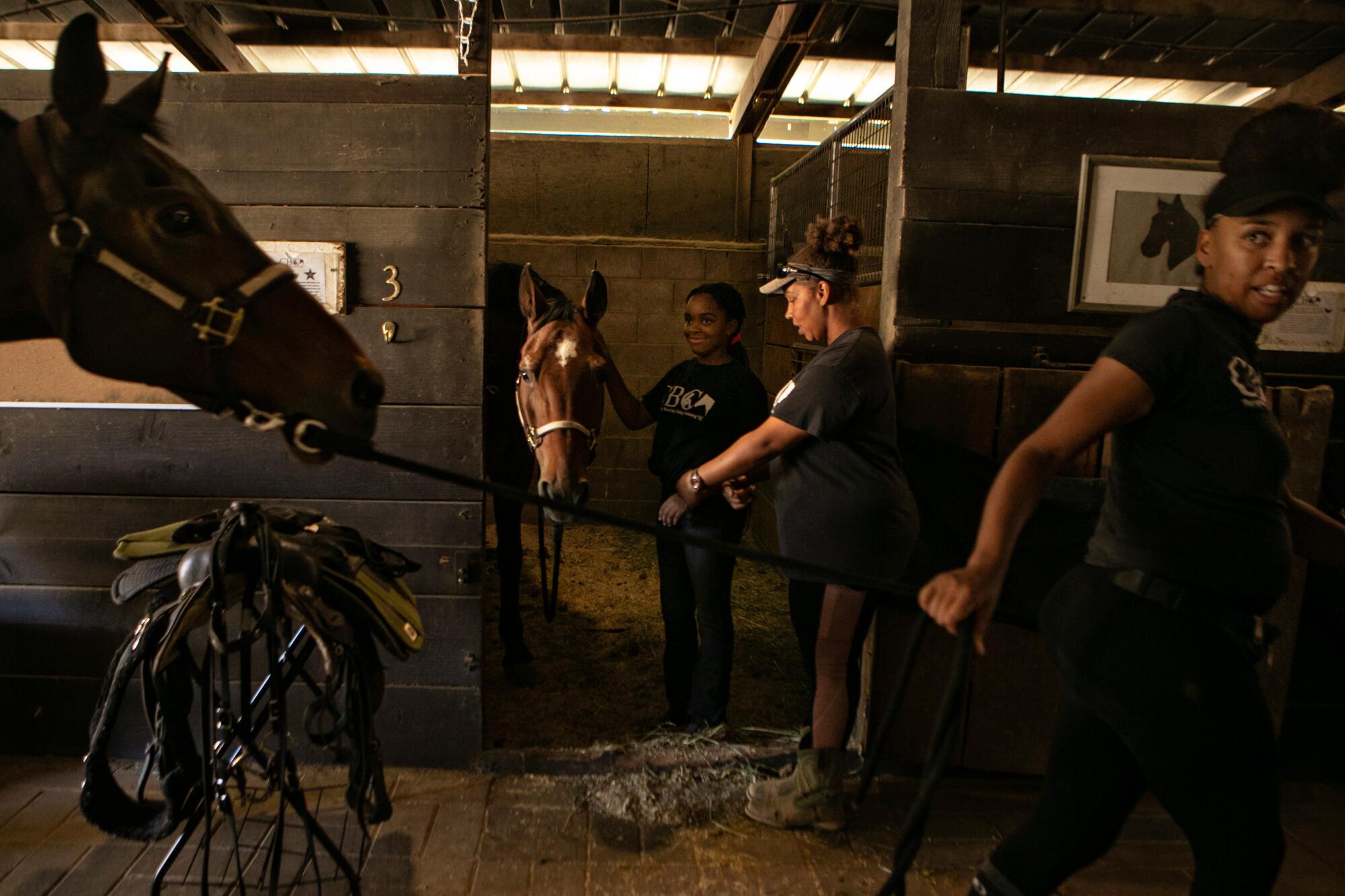
For decades, few challenged Pacific Grove’s Feast of Lanterns, even when locals wore yellowface and slanted eyes. Now some see hope for a racial reconciliation.
When she was little, Chambers dreamed of becoming the first Black woman on the U.S. Olympic equestrian team. “There still hasn’t been one!” she says.
The sisters felt so alone and unwelcome whenever they’d tag along with their father, a horse trainer, to predominantly white equestrian events in the Sacramento area.
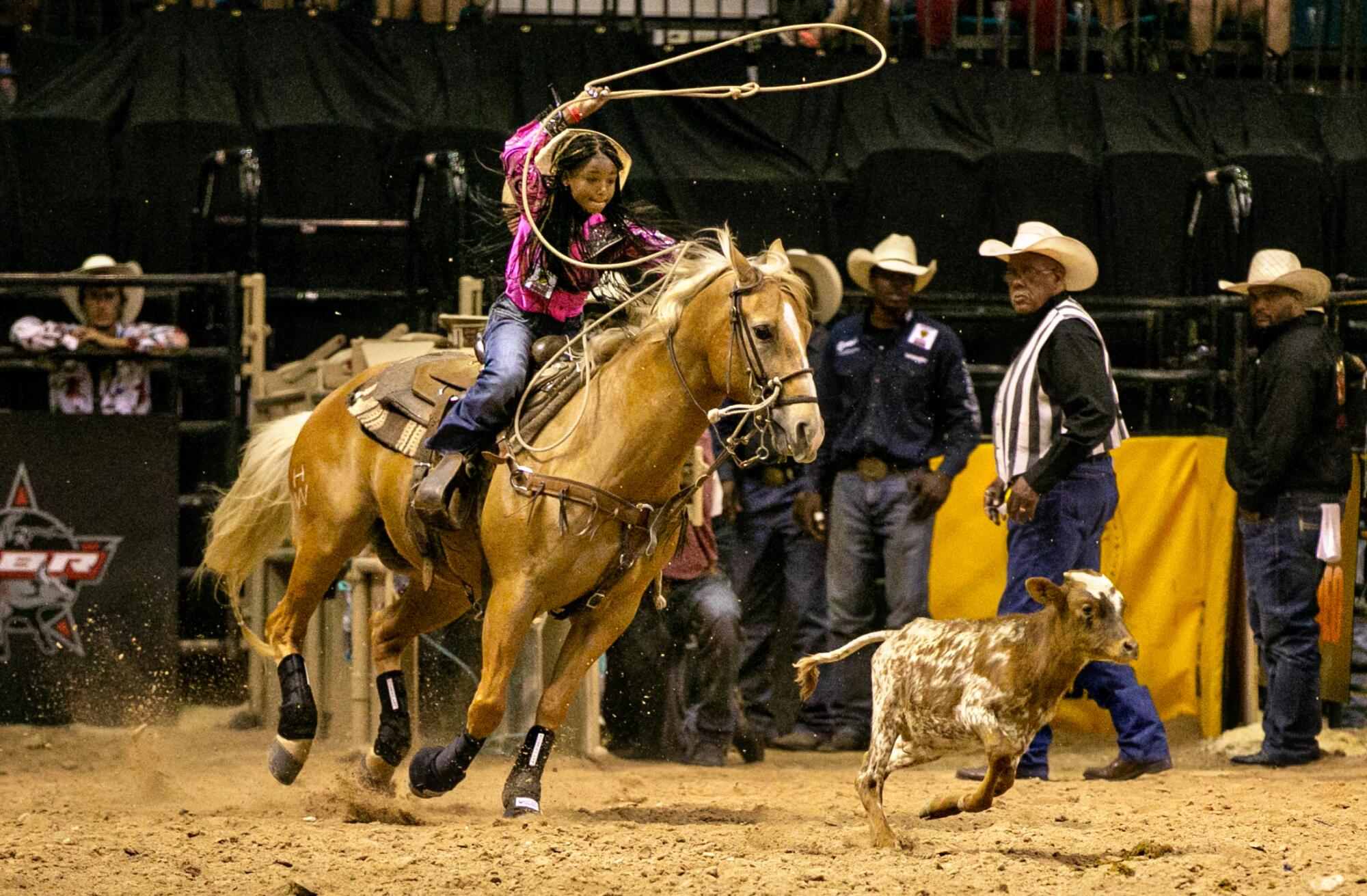
Now they serve as an inspiration for Black riders, many of whom come because they know the sisters will understand how racial experiences affect their well-being and their ability to bond with horses.
Troy Jackson, a Black rancher who lives a few miles from the academy, sounds charmed when talking about the serenity and peace he experiences on horseback.
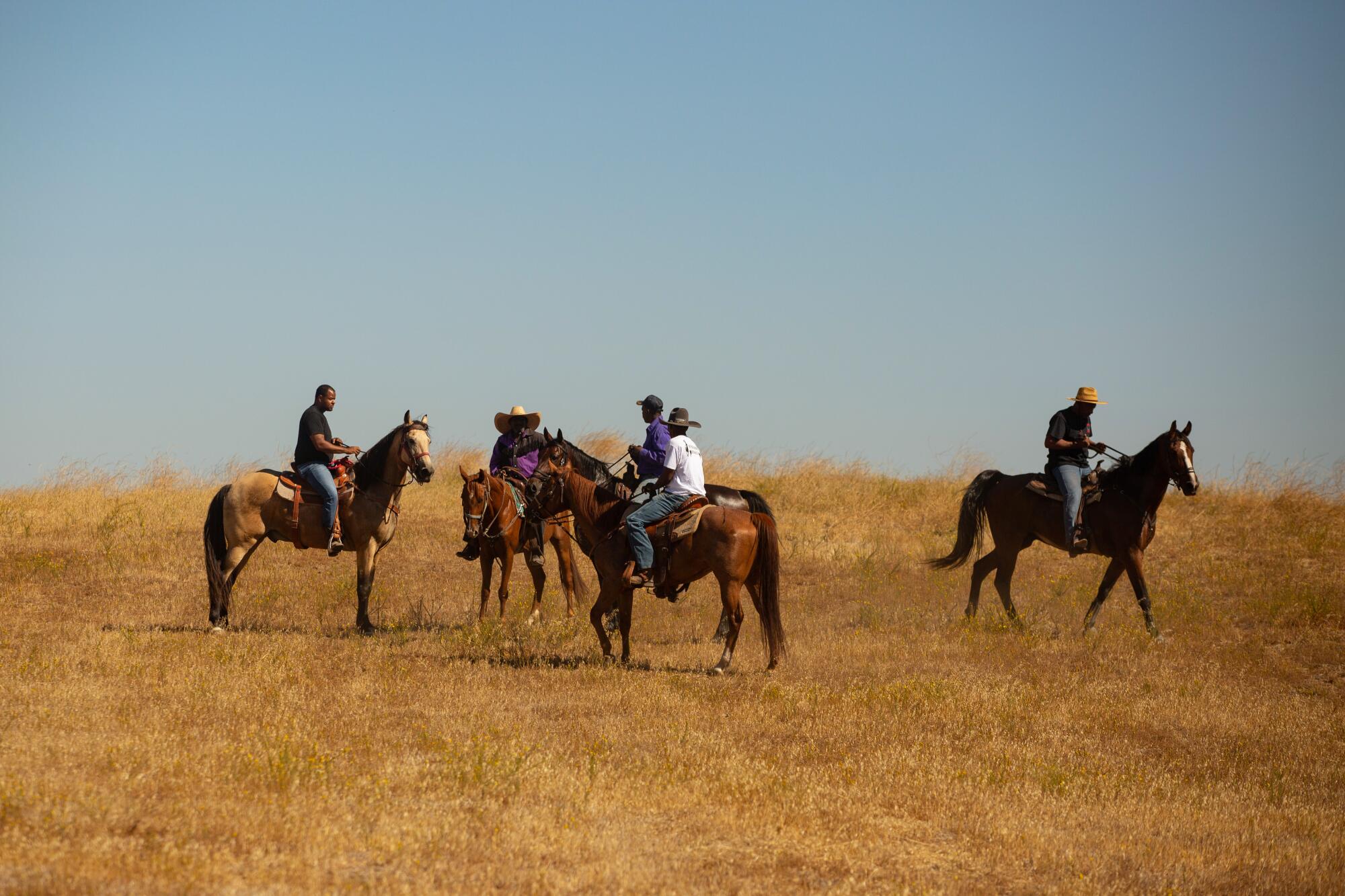
“When you’re out there, you’re free and things just flow,” he says. “It’s spiritual. It becomes a part of who you are.”
Jackson’s property sits at the end of a long gravel driveway lined with horse pastures in the no-stoplight town of Wilton. It’s the home base for another riding club, the Wiltown Riders.
Jackson, 57, relaxes on a lawn chair next to his man-made fishing pond one evening. Some Wiltown Riders, including his wife, Vicki, play dominoes, sip beer, listen to soul music and swap stories.
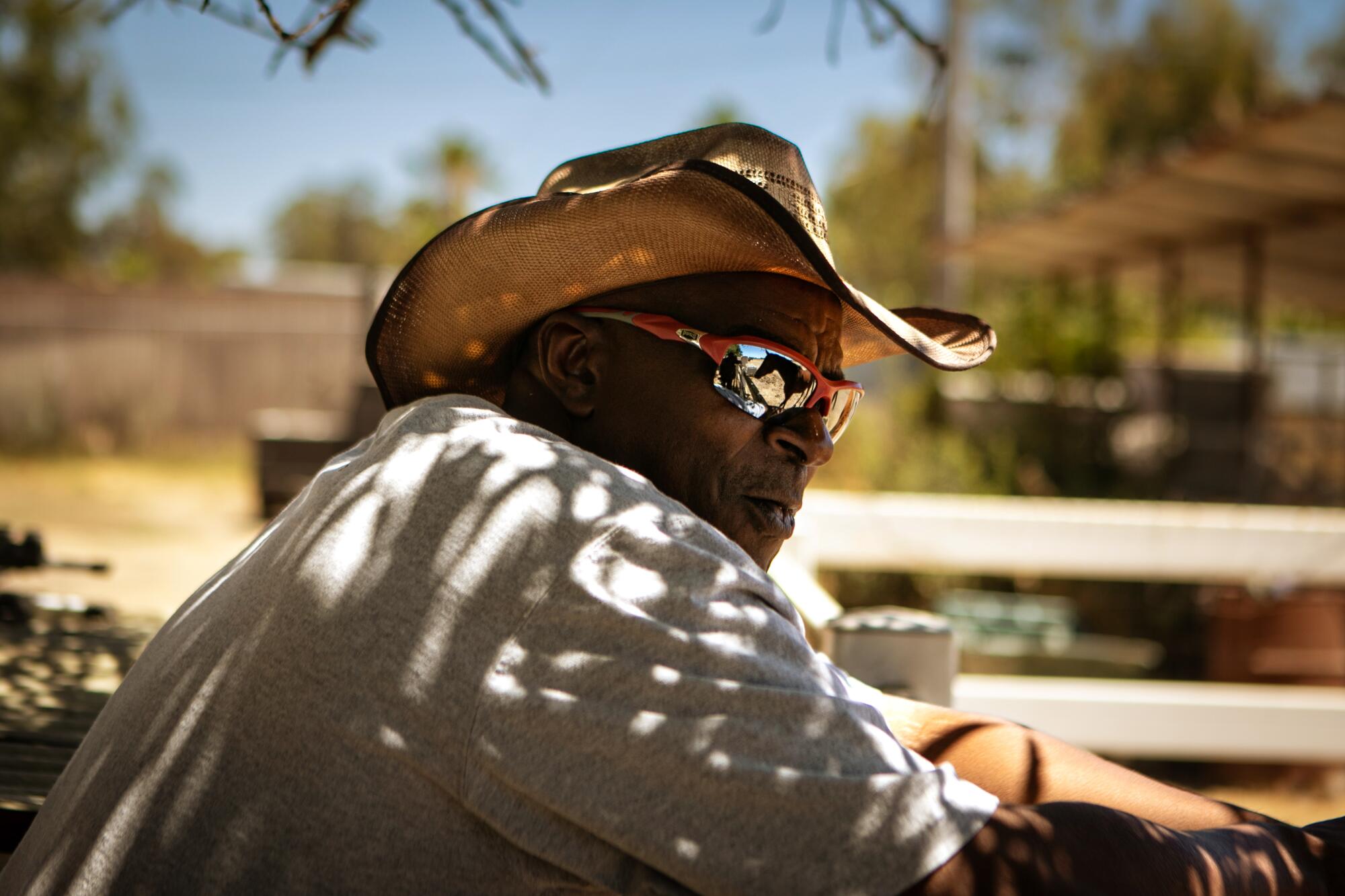
One of the family’s horses, Jellybean, approaches to nuzzle my neck when I move in to take a selfie.
The sun casts shadows of palms on the fishpond as more club members arrive in their boots and hats. Gatherings are held potluck-style, with enough free barbecue, grilled steaks and potato salad for everyone.
Later, Brooke Jackson, Troy’s cousin, wows the group by balancing atop Jellybean on two feet.
To give me a glimpse of the American West from their vantage point, a member loans me her Jack Daniel’s cowboy hat, and at the group’s insistence, I hoist myself onto Jellybean for a surprise ride.
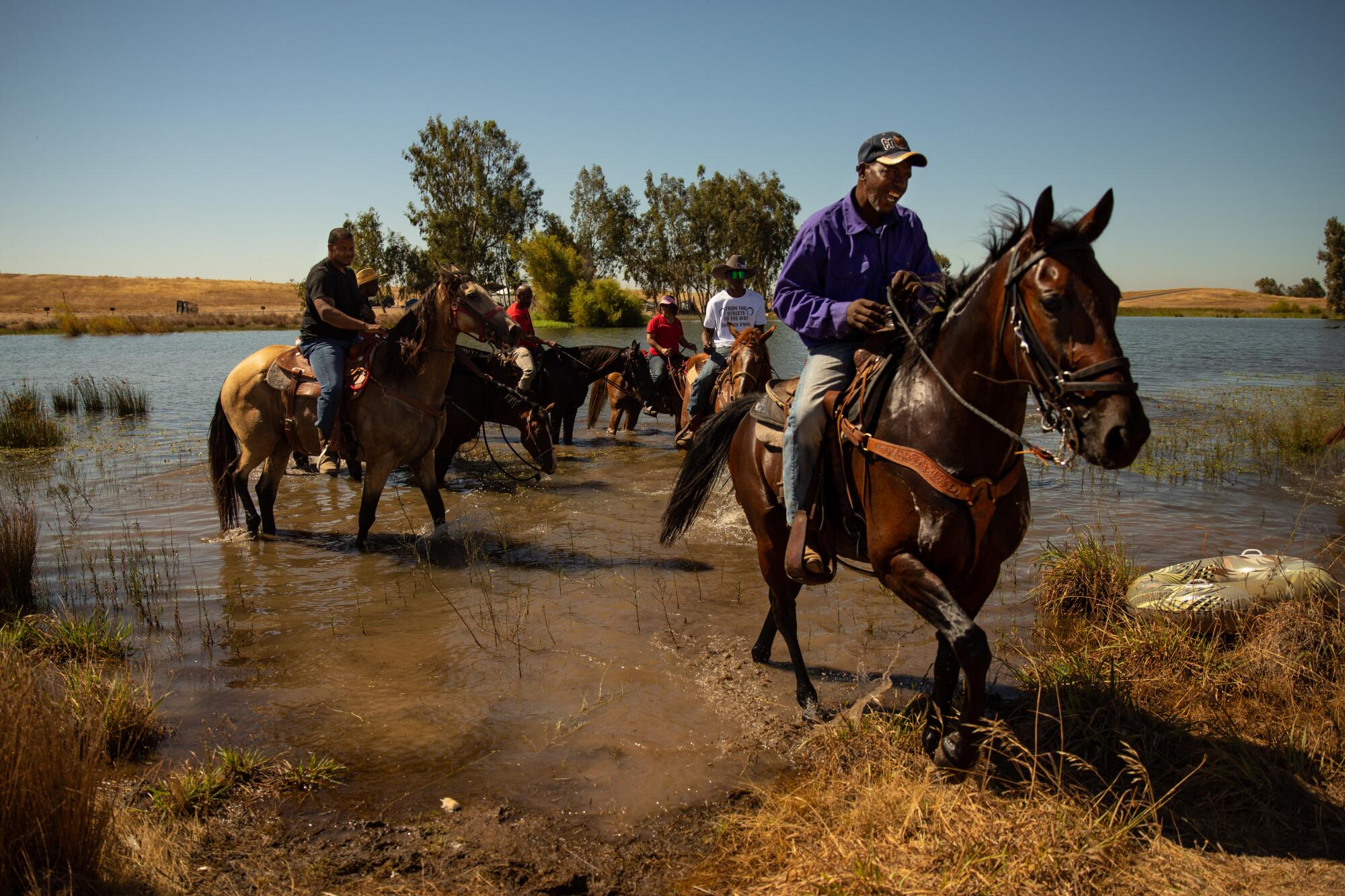
“Tip your hat! Tip your hat!” they shout as I tap my heels against Jellybean’s sides to start my journey. I oblige, mustering all of the panache of the fictional cowboys I’d grown up watching on TV.
Everyone bursts into laughter and cheers as one of the Wiltown Riders leads us into the sunset.

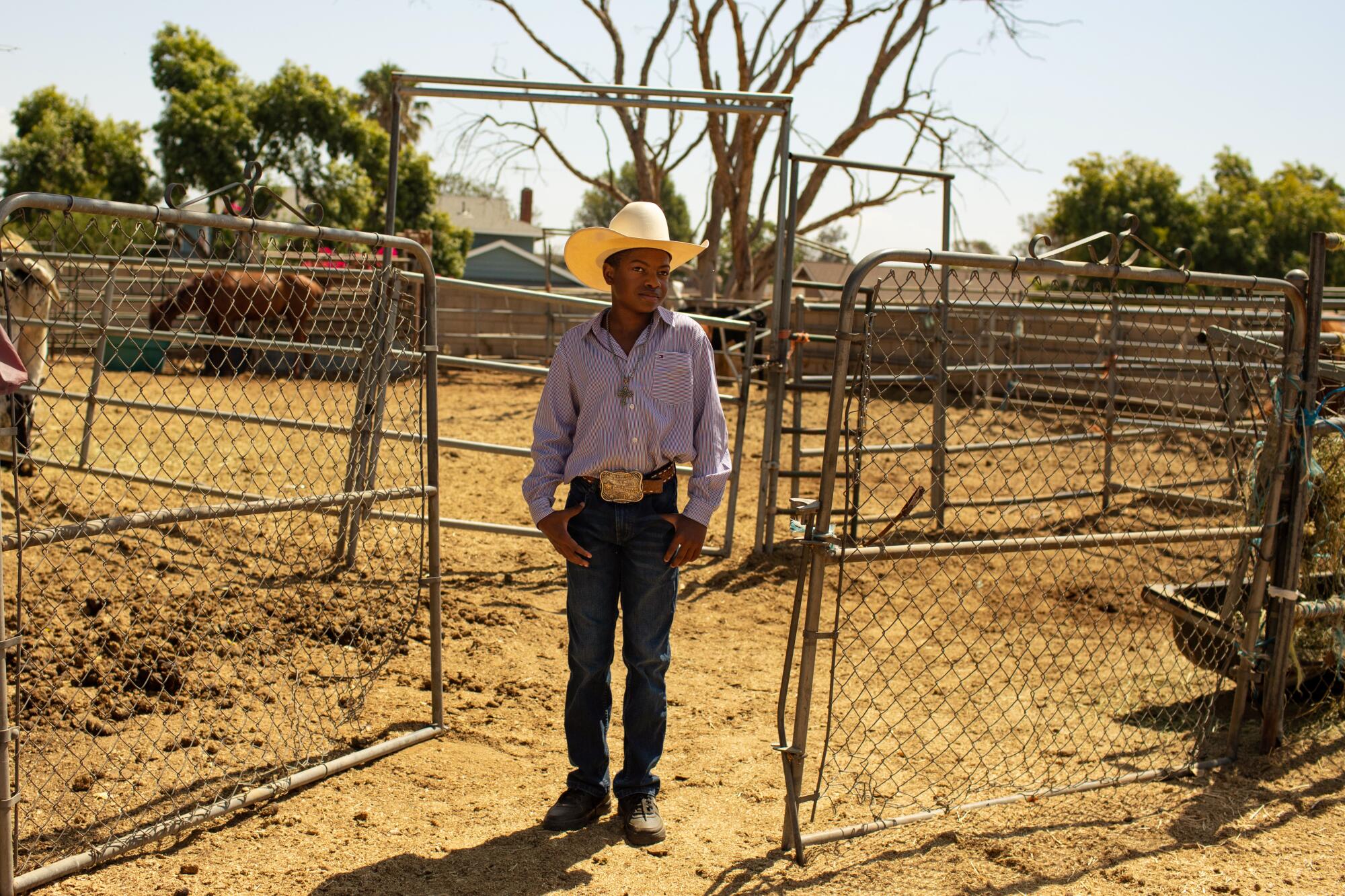
Closer to L.A., Jennings instills western traditions in a different way — by helping his son realize his dream of becoming a household name in the mainstream rodeo world.
The family’s unassuming one-story home looks similar to others on this residential block, but the backyard is almost all dirt and metal corrals. The slight funk of manure seasons the air. Horses and bulls idle in the hot sun.
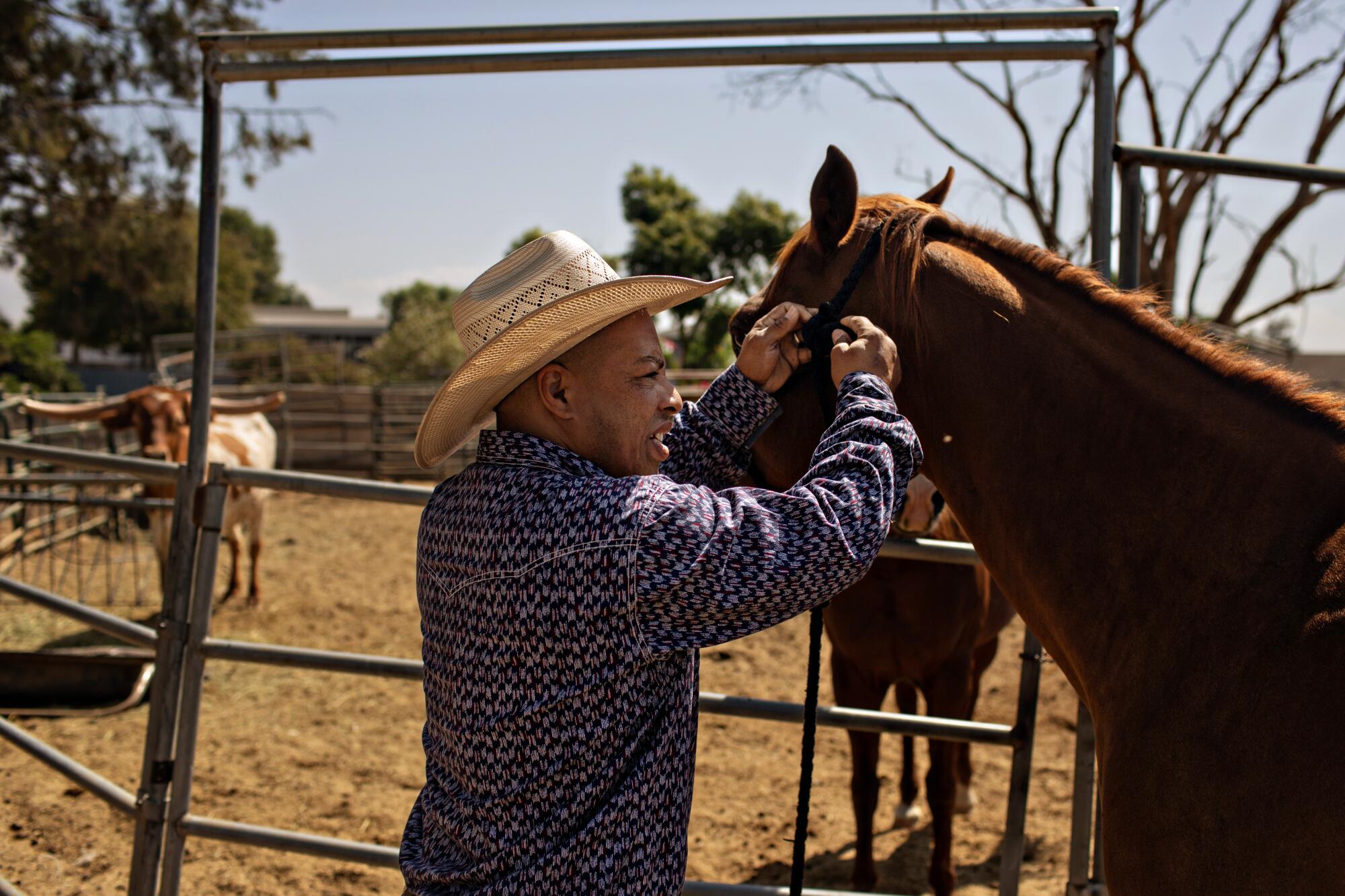
Andrew practices on the younger, lighter-weight bulls whenever he likes. With his cowboy hat pulled low over his face, he flashes the slightest grin while displaying the engraved world championship buckle he won at a peewee league bull riding tournament in 2020.
Jennings says he doesn’t want to burden his children with lessons on the sport’s history of racism. The Bill Pickett Invitational Rodeo is the only such event the family attends. I watched Andrew compete in Las Vegas last year, as well as at the rodeo in City of Industry in July.
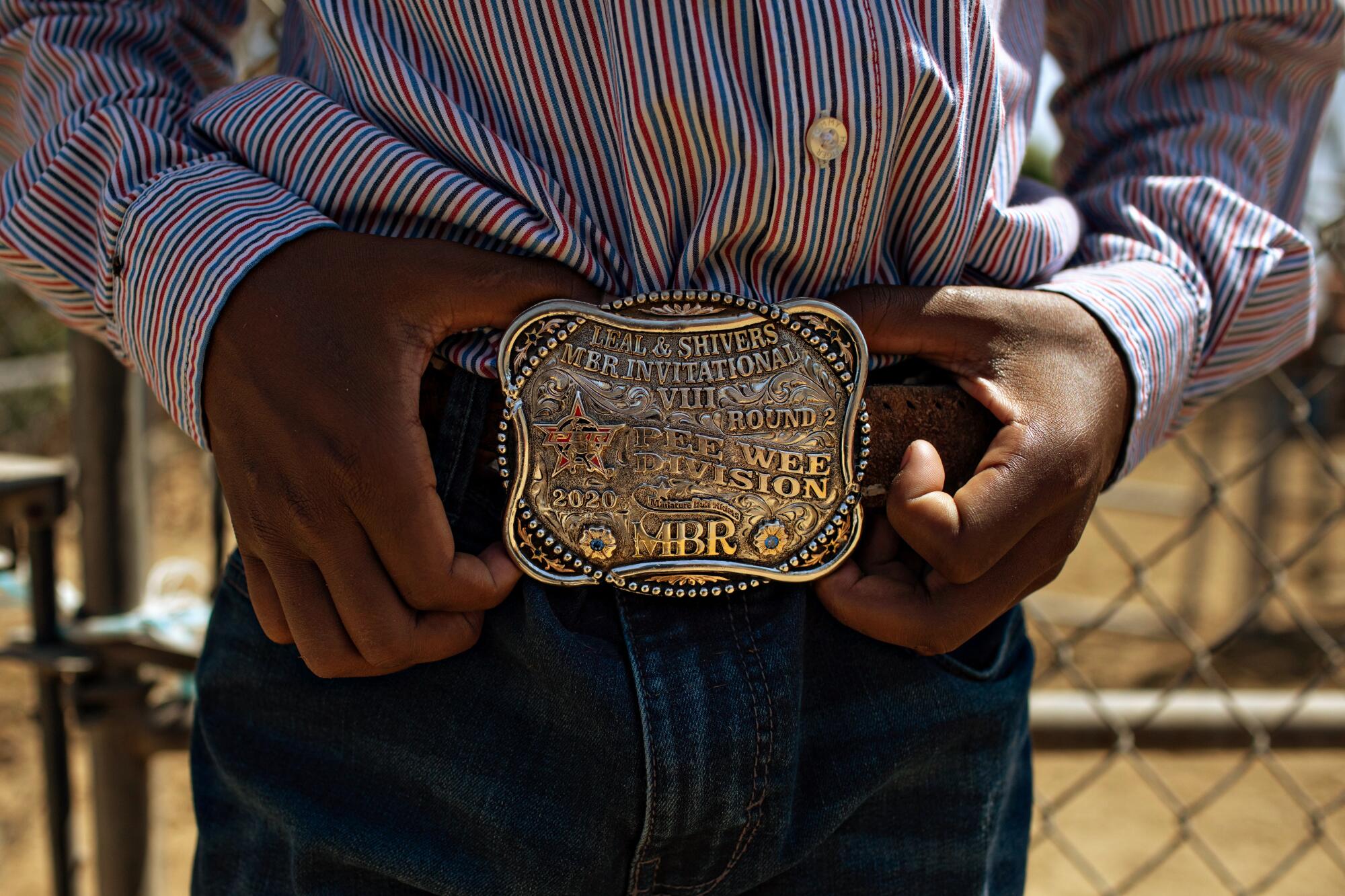
“I still take them back, so they can see their people,” Jennings says of those outings. “But we focus on just being a cowboy, plain and simple.”
There’s nothing “plain and simple” about being Black in America, yet Jennings’ attitude rings true in the democratizing forum of a rodeo arena.
Horses and bulls don’t care about the color of your skin or how many hard knocks you’ve suffered. It all comes down to a test of strength, balance and emotional fortitude.
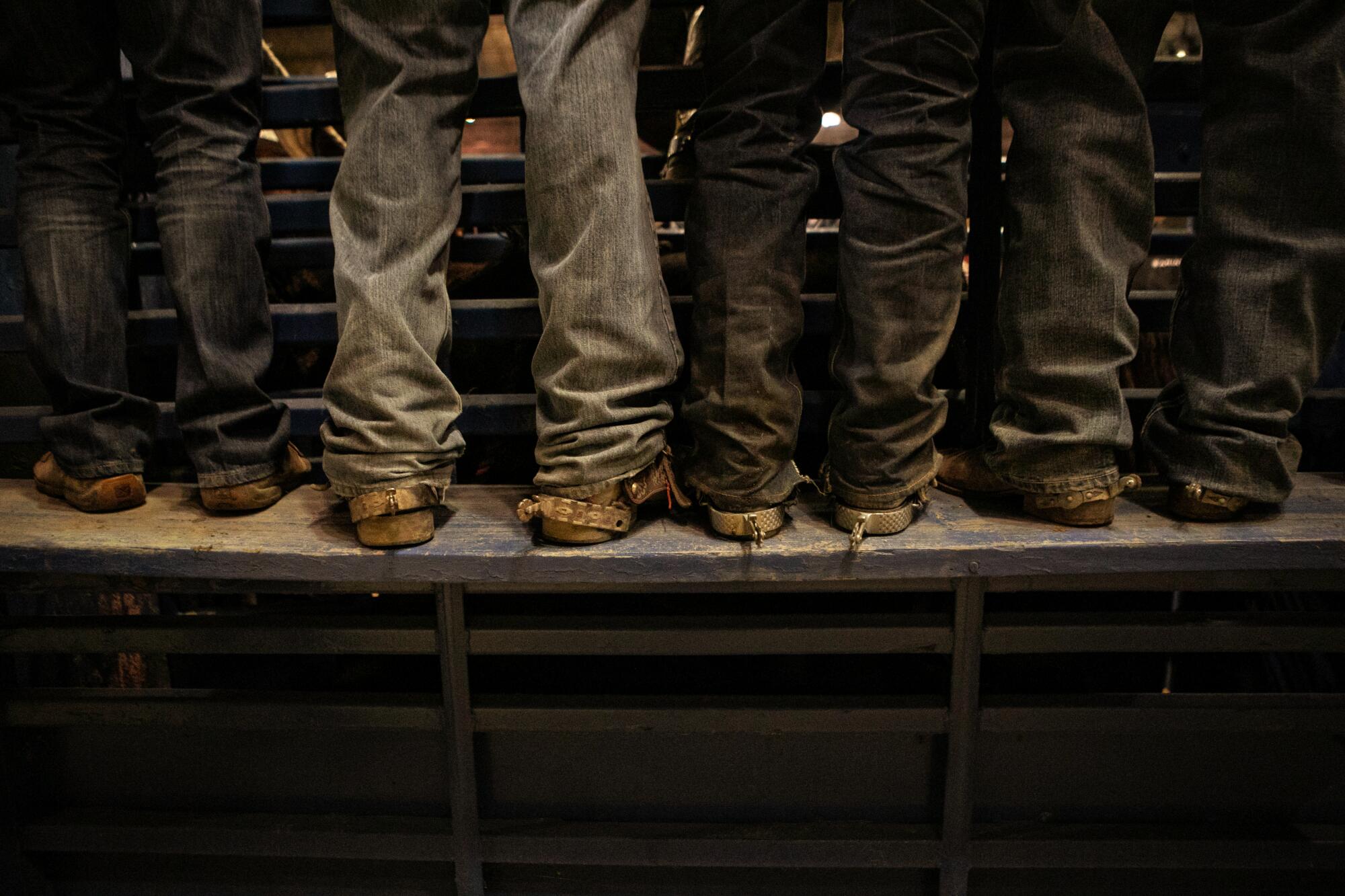
Jennings drives Andrew to rodeos in the Navajo Nation, and to others where most competitors are either white or Mexican American. The family invites me to watch Andrew at his next youth rodeo in San Bernardino, this one organized and emceed by Jennings.
The conflict over ethnic studies reveals painful truths in Paso Robles.
There is no soul music at this rodeo — and no anthems extolling Black pride. Country and western songs blare from speakers for a smattering of people holding tailgate parties.
The pint-size competitors line up in their chaps and remove their hats for a prayer and the playing of “The Star-Spangled Banner.” Andrew is one of two Black riders among his mostly Latino and white peers.
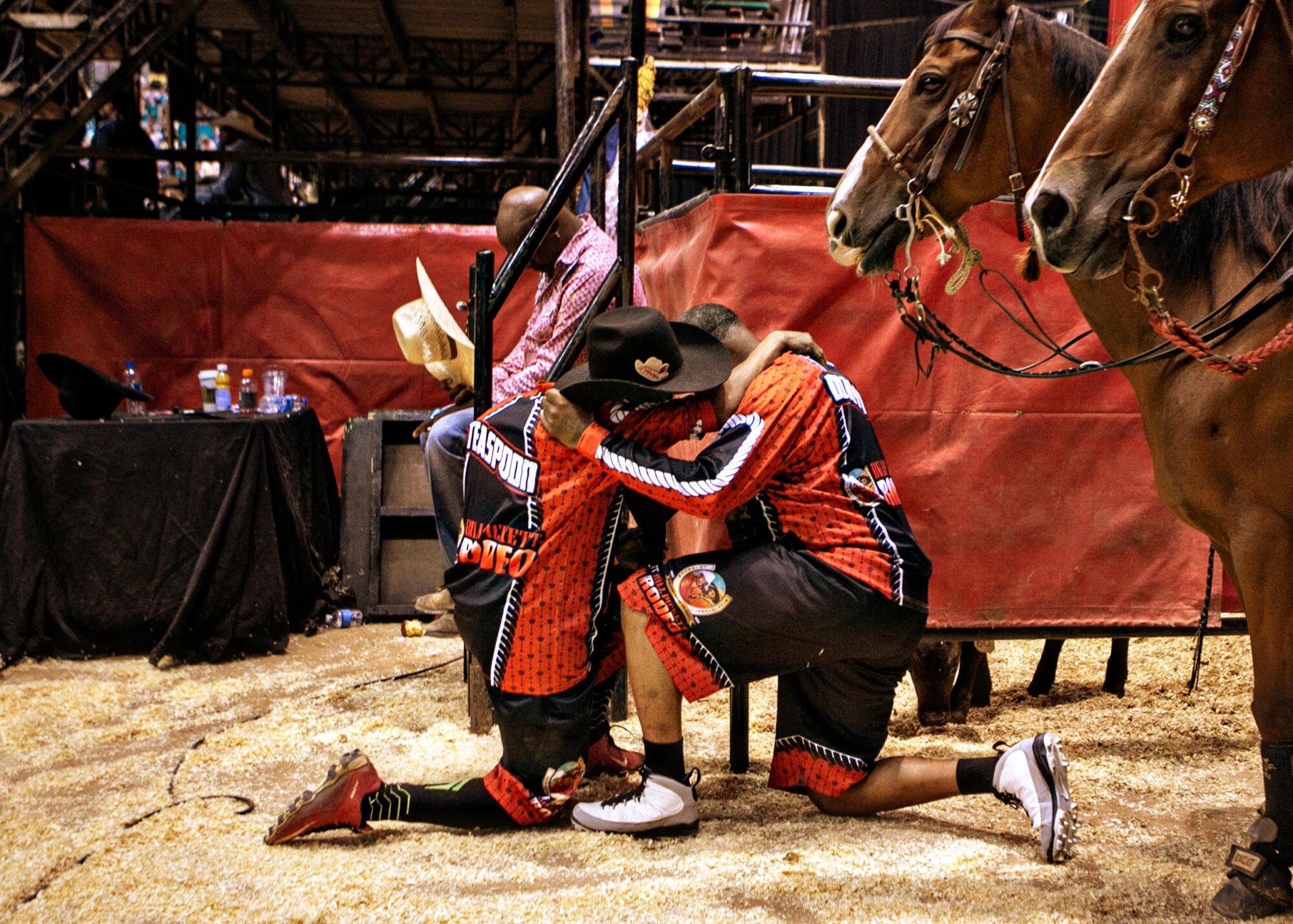
He stands on rails in one of the chutes and tightens ropes around his bull. His mother, Kizzy Jennings, and younger sister, London, watch from the sidelines.
When it’s Andrew’s turn, country singer Tracy Lawrence’s “Sticks and Stones” drifts over the arena as Jennings shouts encouragement on the microphone: “You’re going for the moment right here, Andrew!”
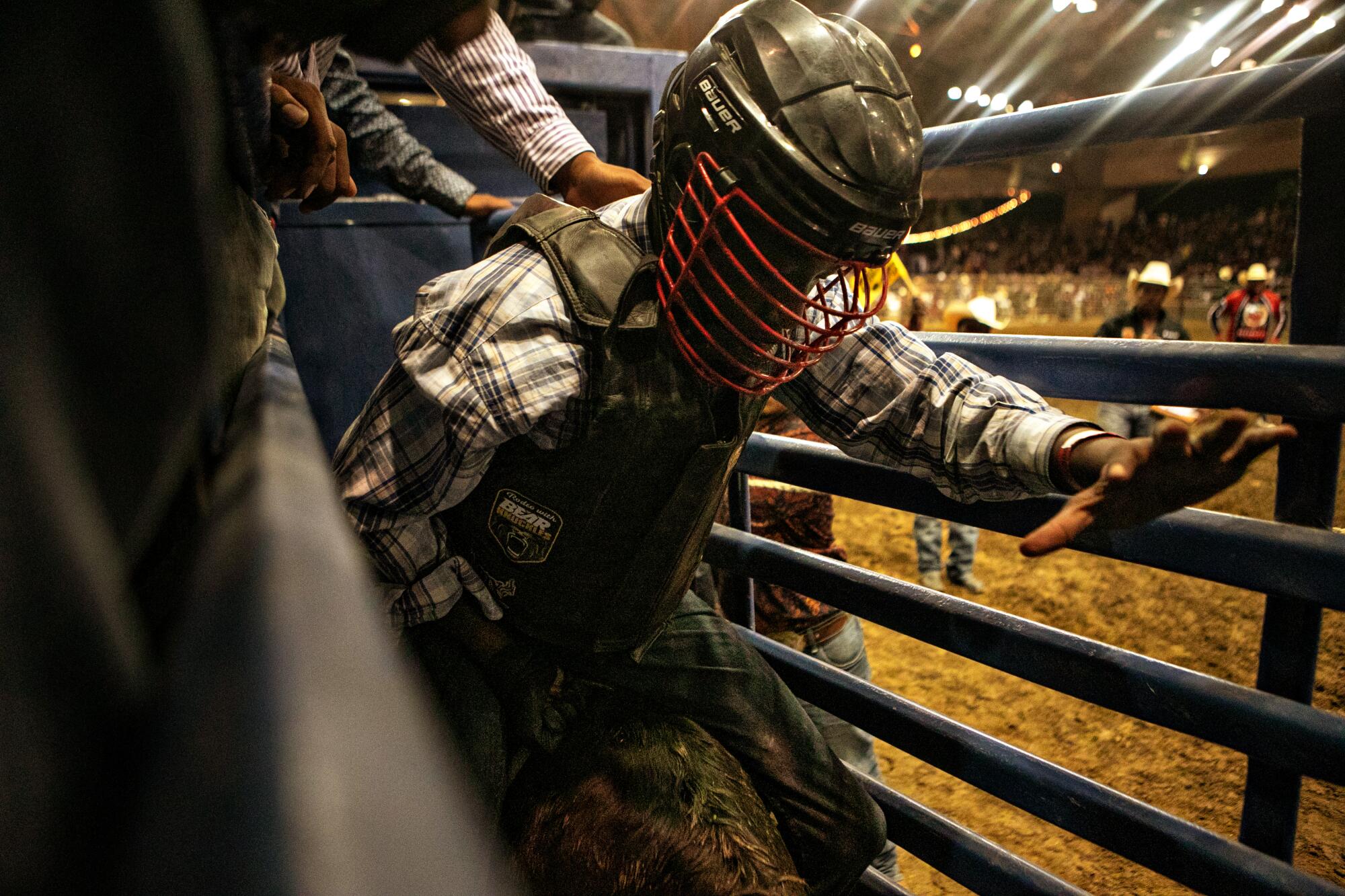
The bull charges out of the gate, kicking up its hind legs in an attempt to fling Andrew off. But Andrew keeps his cool for five, then 10, then 15 seconds, extending one hand in the air as the bull bucks and turns.
Andrew looks only mildly satisfied with his showing.
“If I was to get a better bull, I feel like I could’ve done better,” he says moments later, catching his breath.
Andrew’s determination to become a rodeo star drives home an idea that everyone who opened their lives to me expressed in some fashion: The culture of the West has never been white America’s alone. For Black Americans, this lifestyle is all the more empowering because it connects us to a history that many of us are only beginning to learn.
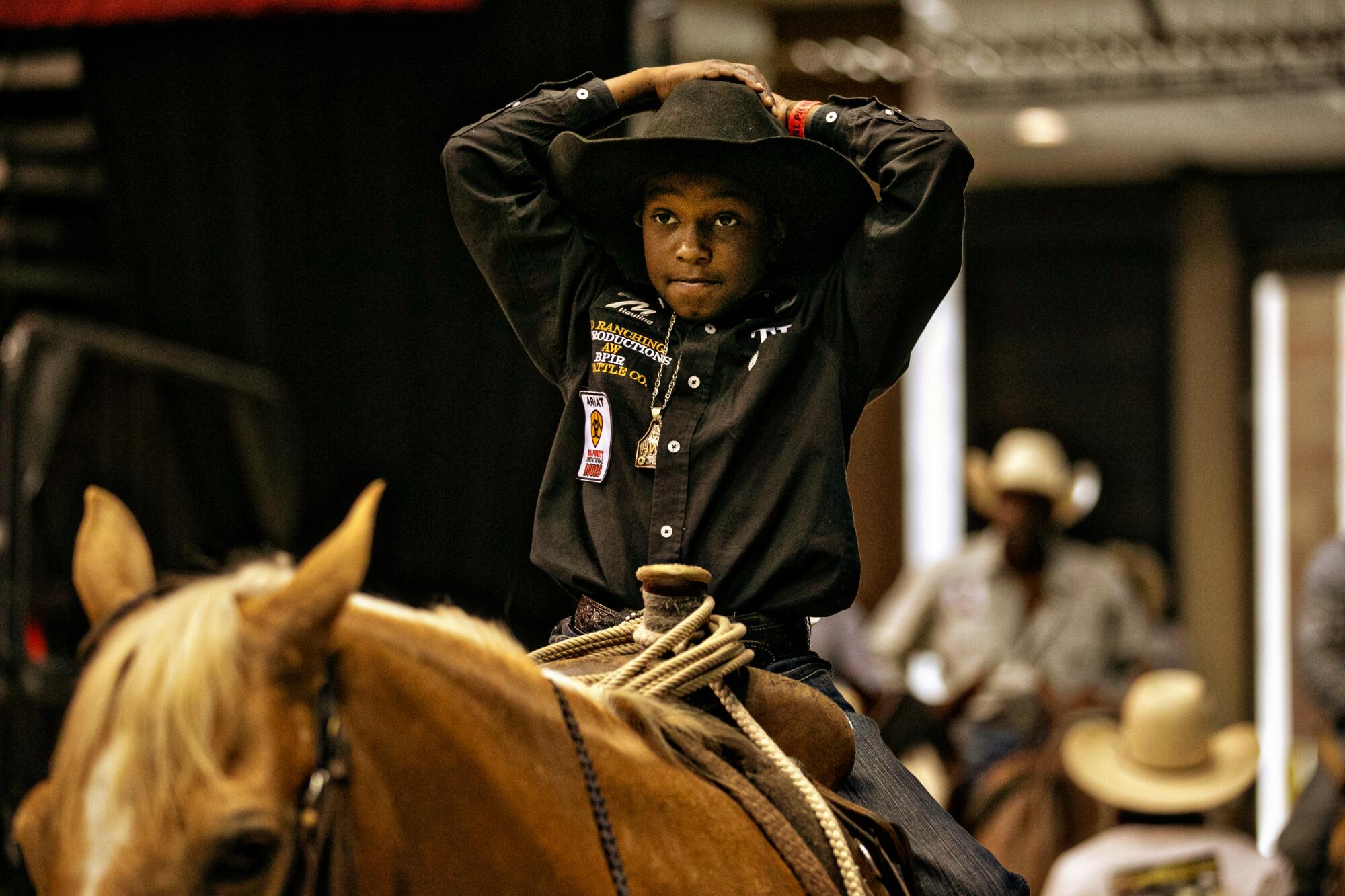
When I was Andrew’s age, I couldn’t imagine being a cowboy.
I feel grateful to be here to witness him doing what he loves, because I know that whenever he pictures a cowboy in his mind, he will see himself.
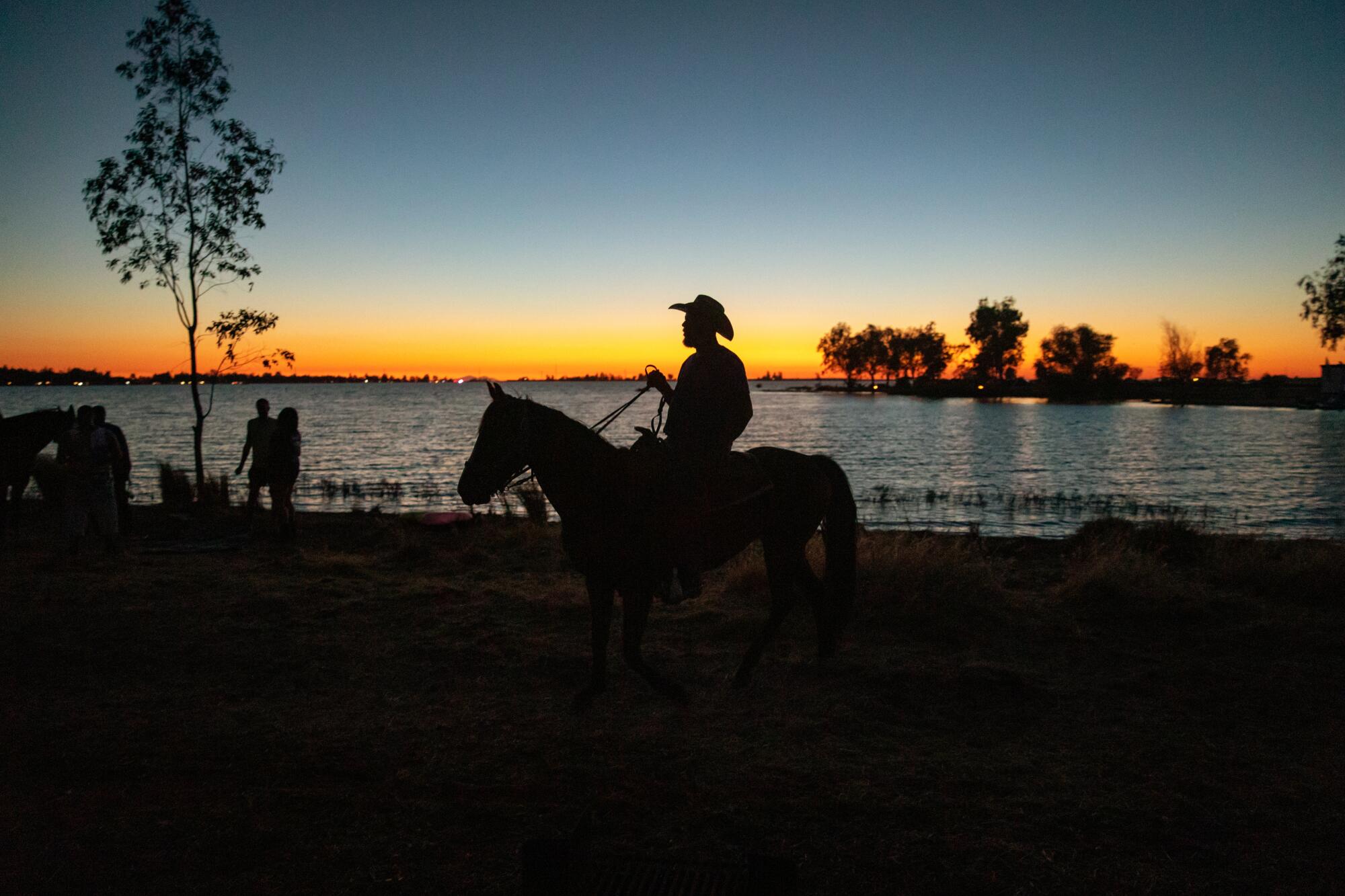
More to Read
Sign up for Essential California
The most important California stories and recommendations in your inbox every morning.
You may occasionally receive promotional content from the Los Angeles Times.
